


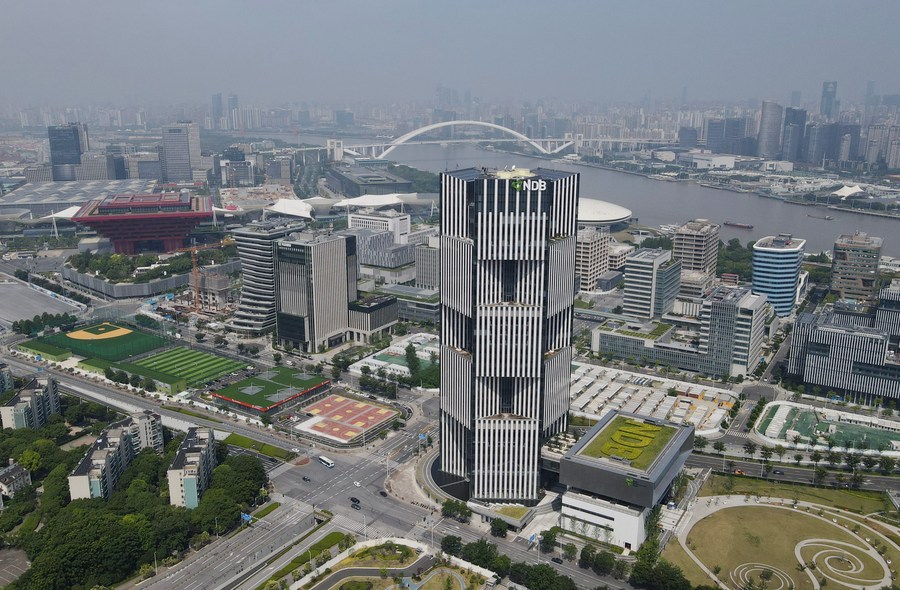
Experts take heart from leaders' summit championing cooperation, development
A summit of leaders of the BRICS nations has set the stage for greater and more visible efforts by the grouping to support global cooperation and boost development and innovation, analysts say.
At the summit last week, Chinese President Xi Jinping said the five nations need to work together to uphold solidarity and global tranquillity, maintain cooperation to boost development and tackle challenges together while continuing to innovate and uphold openness and inclusivity to pool their collective wisdom.
"It is important that BRICS countries support each other on issues concerning core interests, practice true multilateralism, safeguard justice, fairness and solidarity and reject hegemony, bullying and division," said Xi.
The calls at the event resonated with the members of the grouping: Brazil, Russia, India, China and South Africa. And observers note that these nations working together are well-positioned to contribute to multilateral cooperation.
In his remarks, Xi called on the BRICS to expand coordination and cooperation at the current crossroads of history, said Eduardo Klinger Pevida, the director of the Center for Analysis and Studies on China and Asia and a member of the Academy of Sciences of the Dominican Republic. "The force that holds (the BRICS) together is not ideology nor politics but the identification of shared interests, especially for development."
This is particularly important now, as the "combination of the COVID-19 pandemic and the Ukraine crisis has resulted in disruptions to global industrial and supply chains, sustained hikes of commodity prices, and weaker international monetary and financial systems", the analyst said.
Underscoring the themes Xi highlighted, multiple undertakings have been launched under the BRICS cooperation framework this year, including the Initiative on Enhancing Cooperation on Supply Chains, the Initiative on Trade and Investment for Sustainable Development, and the Strategy on Food Security Cooperation, among others. These efforts are aimed at jointly tackling the largest challenges that lie ahead.
At the summit, Xi pointed to the value of cooperation. "It is important that BRICS countries support each other on issues concerning core interests, practice true multilateralism, safeguard justice, fairness and solidarity and reject hegemony, bullying and division," Xi said.
Argentine President Alberto Fernandez confirmed his desire for the country to join the bloc. "We are honored by the invitation to this expanded BRICS meeting. We aspire to become full members of this group of nations that already represents 42 percent of the world's population and 24 percent of the global gross domestic product," Fernandez said during the High-level Dialogue on Global Development on Friday.
While joining the group could take time, it would mark a significant milestone for Argentina, observers say.
Bringing nations together
Bringing communities closer together is one of the priorities for the BRICS, according to Brazilian President Jair Bolsonaro. Bolsonaro agrees with Xi that the way forward amid the many challenges facing the world is more cooperation.
"Brazil's response to these challenges is not to close itself off. On the contrary, we have tried to deepen our economic integration," he said.
The writer is a freelance journalist for China Daily.

Diplomats stress unity, coordination among nations against threat of inflation
Senior diplomats from China and South Africa have emphasized the partnership nature of BRICS countries, saying that the grouping is "not a bloc" that works on geopolitical and economic confrontation.
The diplomats made the remarks at a news briefing in Beijing on Monday regarding the just concluded 14th BRICS Summit and the High-level Dialogue on Global Development.
"Blocs block" and BRICS is about partnership rather than big muscle, the South African ambassador to China, Siyabonga Cyprian Cwele, said alongside Li Kexin, director-general of the Chinese Foreign Ministry's Department of International Economic Affairs.
The two diplomats spoke to reporters at a time when China is the rotating chairman of BRICS this year, while South Africa will take the chair next year.
Li said the idea "is not to create a new bloc", when answering a question about the potential expansion of BRICS and its interactions with other groupings such as the Group of 7, which is also known as the G7.
The five BRICS nations-Brazil, Russia, India, China and South Africa-work for solidarity and common endeavor, and it is "not right to have a new bloc" against a certain bloc, he said. Countries should contribute more "building blocks for the world", not a bloc against each other.
In terms of the relations between BRICS and the G7, Li said there should be "good interactions among these groupings", and inclusiveness should be the key word.
When asked about discussions by the BRICS leaders about handling inflation, Li said the leaders did talk about coordination of macroeconomic policies. He said the current inflation is systemic, there is no single reason for it, and people need to look at previous occasions when inflation ravaged economies.
Li said the current round of inflation started one or two years ago due to monetary easing policies in major economies, resulting in an excessive money supply in the market. In addition, unilateral sanctions imposed after the Ukraine crisis broke out caused commodity prices to soar, causing inflation to spike further.
Without naming the United States, Li said another element that gave a strong impetus to inflation is the high tariffs imposed on China by a major economy. This major economy should change its current policies geopolitically and economically, he said.
Both diplomats spoke highly of the outcomes from the 14th BRICS Summit on Thursday and the High-level Dialogue on Global Development on Friday, both chaired by President Xi Jinping.
Li, the Chinese director-general, noted the two major events last week were held amid the COVID-19 pandemic, the Ukraine crisis and a global economic downturn. He said "there is a strong force" in the world to address these challenges, finding out how to uphold justice and advance recovery.
Both diplomats spoke about the high-level dialogue on Friday that brought together 13 other developing countries alongside the five BRICS nations.
Beijing has adopted an "outreach strategy" to advance the "BRICS Plus "model that engages more countries in BRICS events and its agenda at both the summit and working level, said Li.
The South African ambassador said Friday's event "opened access", which brings hope to African countries and developing countries in other regions.
He warned over impulses to "think local rather than global" as well as nontraditional threats to humanity, and countries should assist each other in an uncertain time.
The issue of solidarity becomes important, and countries need global cooperation and technologies to deal faster and smarter with threats like pandemic viruses, he added.
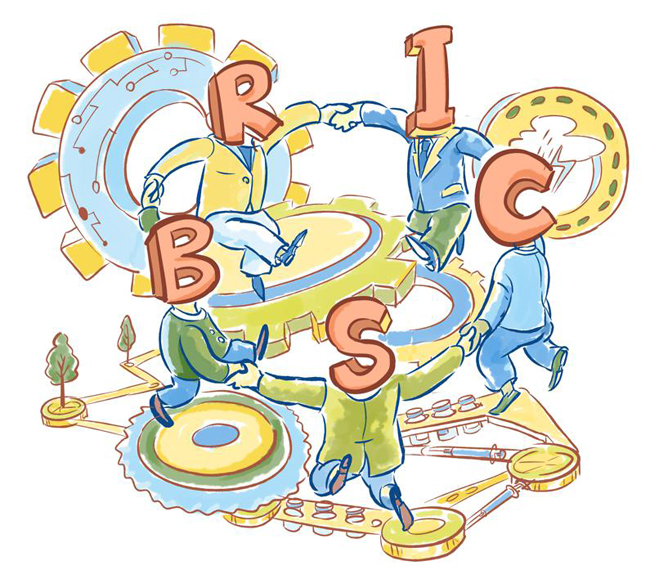
Experts speak highly of president's insights to tackle global challenges
The BRICS countries, with a more practical and inclusive focus on their journey of cooperation, as expounded by Chinese President Xi Jinping, can boost global governance and build a community with a shared future for mankind, analysts said.
And high-quality collaboration among BRICS nations can help the world overcome the COVID-19 pandemic and other challenges, and achieve the United Nations' 2030 Agenda for Sustainable Development.
With other BRICS leaders, Xi highlighted these themes in his video speeches at the BRICS meetings last week. The grouping comprises the major emerging economies of Brazil, Russia, India, China and South Africa.
Swaran Singh, a professor of diplomacy and disarmament at Jawaharlal Nehru University in India, described Xi's remarks at the BRICS summit on Thursday as "subtle, broad-based, and philosophical".
The significance of the 14th BRICS Summit lies in this being the most potent grouping of "emerging economies" that have been the locomotive of post-pandemic resilience in the global economy and healthcare relief, he said.
He said the BRICS summit, which was hosted by China, reinforces its importance in global manufacturing and supply chains, "making it pertinent that emerging economies work with China to reinforce their complementarities to democratize global economic decision-making and enhance global economic benefits".
Dennis Munene, executive director of the China-Africa Center at the Africa Policy Institute, echoed his view, saying that the president's insights inspired hope at a time when the global community is facing unprecedented challenges as a result of the pandemic.
Xi's keynote speech at the BRICS Business Forum on Wednesday again expressed China's unique view of global development, which values harmony, inclusiveness, peaceful development, mutual benefits as well as win-win solutions, so as to jointly build a community with a shared future for mankind, said Gu Qingyang, associate professor of the Lee Kuan Yew School of Public Policy at the National University of Singapore.
Strengthening stability
BRICS serves in maintaining regional and global economic stability and supporting the growth of the digital and green economies. As Xi stressed in his speeches, collaboration among BRICS members is of particular importance, he noted.
"This partly plays a positive and constructive role in alleviating the impact of the pandemic, food and energy shortages, debt crises and aggravation of poverty in emerging markets and developing countries," Gu said. " (BRICS members) should work together to open a new era of global cooperation and development."
Deniz Istikbal, an economic researcher at the policy think tank Foundation for Political, Economic and Social Research in Turkey, said global cooperation should be increased in order to solve the crises in energy and supply chain management.
Istikbal added that the 14th BRICS Summit marks an important threshold for the global economy.
"Unlike Western countries, cooperation between BRICS actors is increasing, and new international alternatives are created. This year's summit is among the important indicators of this," he said.
Glenn Wijaya, an adviser to the Center for Indonesia-China Studies, said the most important points from Xi include the emphasis on the need for BRICS nations to assist all developing countries in accelerating the development of the digital economy, green transformation, as well as cooperation in the response to COVID-19.
"These are critical pillars if the world is serious about achieving the 2030 Sustainable Development Goals," he said.
Wijaya noted that substantial SDG objectives can only be realized through strong collaboration.
"I hope that cooperation between BRICS nations can spread to other non-core members, such as Indonesia," he added.
Munene said that the president's speech at the High-level Dialogue on Global Development on Friday was full of vigor and optimism.
In search of a balanced, inclusive, common prosperity and win-win cooperation for global development, Xi supported the need to jointly build international consensus on promoting development, create an enabling international environment for development, foster new drivers for global development, as well as forge new drivers for development.
Liu Hongjie in Beijing contributed to this story.
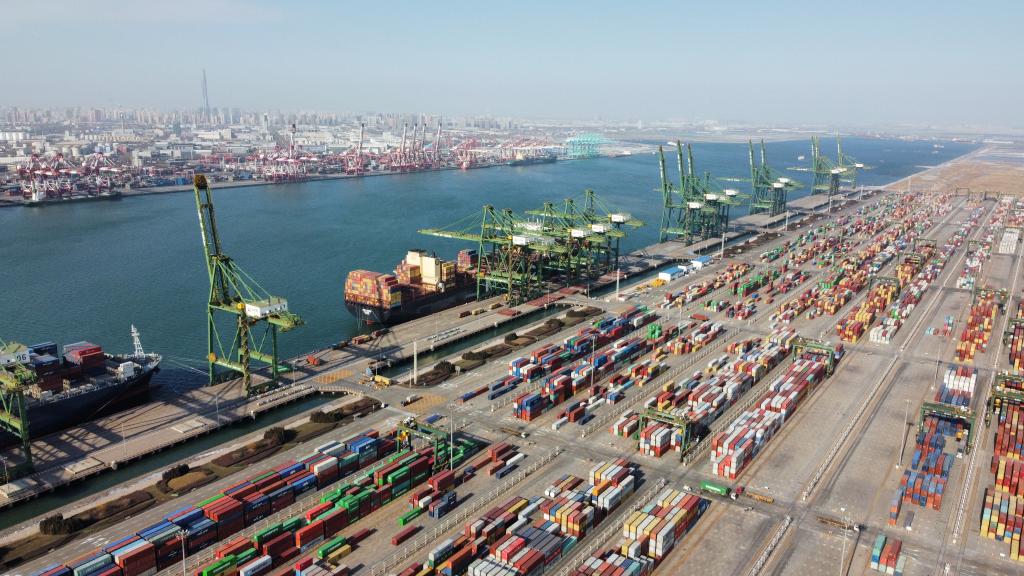
Efforts to propel high-quality growth underpin commitment, experts say
China's latest commitment to expanding high-level opening-up is expected to reassure foreign investors of the nation's promise to relentlessly open its door wider and share development dividends with the rest of the world despite the rising tide of protectionism in some countries.
In a virtual keynote speech to the opening ceremony of the BRICS Business Forum held on Wednesday, President Xi Jinping said that China will continue to pursue opening-up of higher standards, develop new systems for a higher-standard open economy, foster a business environment that is based on market principles, governed by law and up to international standards.
Xi encouraged businesses to invest and develop in China, enhance trade and economic cooperation, and share development opportunities.
In an article published on Wednesday in People's Daily, He Lifeng, head of the National Development and Reform Commission, wrote that Xi Jinping Thought on Socialist Economy with Chinese Characteristics for a New Era makes it clear that expanding opening-up in an all-around manner is an important "magic weapon" for China's economic development.
"We must firmly implement the basic State policy of opening-up to the outside world, build new systems for a higher-level open economy, promote the high-quality development of the Belt and Road Initiative, and push for an economic globalization that is more open, inclusive, balanced and beneficial to all," he wrote.
Experts said the unfaltering commitment to opening-up is underpinned by the nation's efforts to propel high-quality development and reinforce the confidence of foreign investors in the world's second-largest economy, which is striving to prevent an economic slowdown.
China announced a guideline in April on accelerating the establishment of a unified national market that is highly efficient, rule-based, fair for competition and open.
It is also accelerating a fresh revision of the industry catalog that encourages foreign investment.
"China has done well in expanding market access. What matters more now is the building of a transparent, predictable and enabling market system that facilitates business operations following eligible market entry," said Huo Jianguo, vice-chairman of the China Society for World Trade Organization Studies.
As the world's second-largest consumer market and largest trader in goods, China has signed 19 free trade agreements with 26 economies and established 21 pilot free trade zones and the Hainan free trade port, with items on the national and free trade zone negative lists being respectively downsized to just 31 and 27 items. A negative list refers to special administrative measures prohibiting foreign investment in certain industries or areas.
Chinese authorities have also been making diligent efforts to ease the burdens of foreign enterprises and respond to their demands for an environment that includes improvement in logistics and personnel flows, to ensure their normal operations and stabilize their expectations.
Analysts said Xi's reiteration of China's commitment to high-level opening-up on various occasions indicates the nation will deepen domestic reforms to align with high-level international standards and level the playing field while enhancing government services for market entities.
That is in line with the acknowledgment of the decisive position of the market in allocating resources while giving better play to the role of government, a key feature and a fundamental principle of Xi Jinping Thought on Socialist Economy with Chinese Characteristics for a New Era, they said.
"As China pursues high-level opening-up, the nation will greatly break down current monopolies, both administrative and corporate, and further drive the smooth flow of resources and factors for greater vitality," said Guo Liyan, a researcher with the Chinese Academy of Macroeconomic Research.
"Such efforts will effectively meet the needs of both China and the world, so that the rest of the world can benefit from the development and growth of the Chinese market, and work together to maintain the stability of global industrial and supply chains as well as the stable recovery of the world economy," Guo said.
Although temporary uncertainties have either postponed or reduced foreign investments over the short term, surveys from foreign chambers of commerce in China showed that most multinational companies regard China as a major market, and that more investment is expected to come in the medium to long term.
Sang Baichuan, dean of the Institute of International Economy at the University of International Business and Economics in Beijing, said stable expectations are a fundamental driver for foreign investment.
He expects China to vigorously build a market-oriented, law-based and internationalized business environment, and constantly enhance the protection system for foreign investment.
Leon Wang, executive vice-president of AstraZeneca, said China's determination in opening-up means its business environment will continuously improve to make it more attractive to foreign companies.
The company keeps accelerating its footprint in China and will soon have six regional headquarters across the nation to reinforce its presence in the world's second-largest pharmaceutical market.
President Xi Jinping hosted the High-Level Dialogue on Global Development in Beijing by video, where more than a dozen national leaders gathered in the "cloud". What is "BRICS Plus"? What does the "Golden Hall" look like on site? Click the video to find out more!
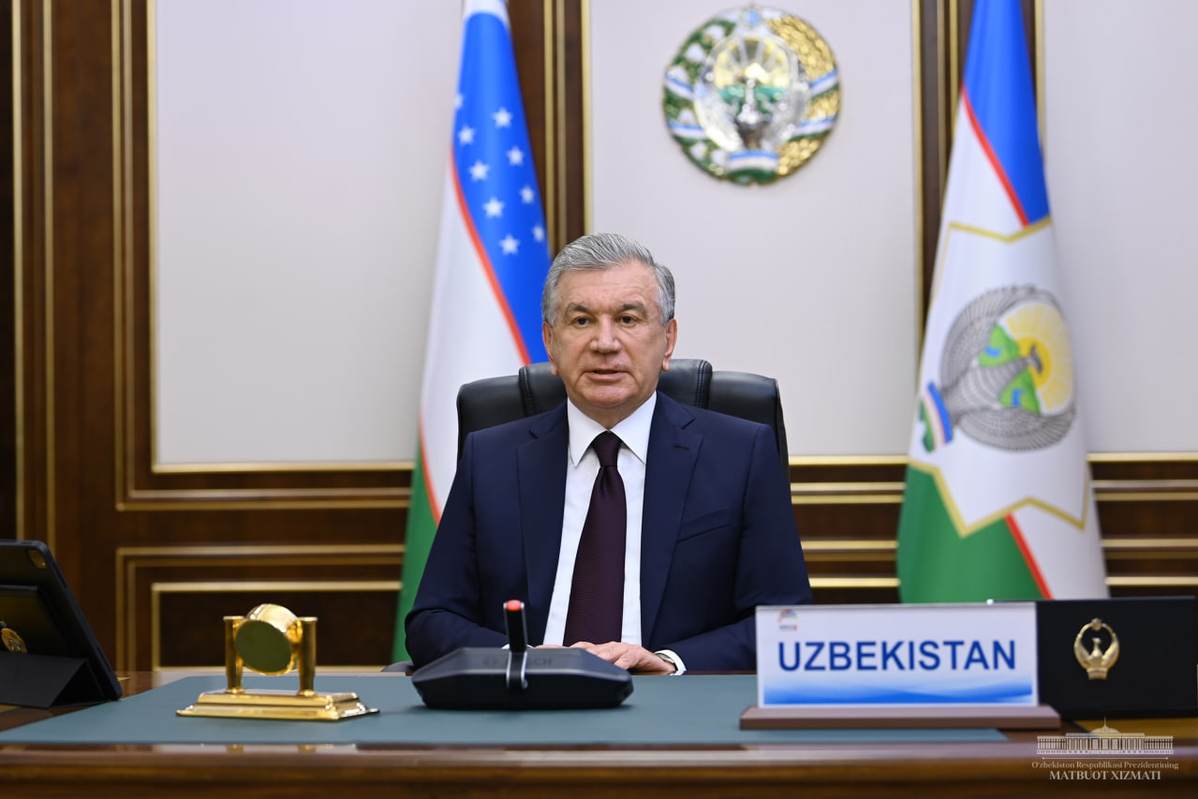
On June 24, President of the Republic of Uzbekistan Shavkat Mirziyoyev took part in a High-level Dialogue on Global Development in the BRICS Plus format.
The heads of state and government of 18 countries of the world took part in the online forum, which was chaired by the Chinese side. Along with the leaders of Uzbekistan and China, President of Algeria Abdelmadjid Tebboune, President of Argentina Alberto Fernandez, President of Egypt Abdel Fattah Al-Sisi, Prime Minister of India Narendra Modi, President of Indonesia Joko Widodo, President of Iran Ibrahim Raisi, President of Kazakhstan Kassym-Jomart Tokayev, President of Russia Vladimir Putin, President of the Republic of South Africa Cyril Ramaphosa, Vice President of Brazil Hamilton Mourao, as well as the heads of governments of Cambodia, Malaysia, Thailand, Fiji and Ethiopia.
The organizers identified the development of global partnership and joint promotion of the Sustainable Development Agenda as the main theme of the event.
The issues of multilateral cooperation in the field of security and stability, expansion of practical cooperation in the field of trade and investment, "green" economy, high technologies and innovations, digitalization, transport and logistics, ecology, humanitarian sphere were considered.
In his speech, the President of Uzbekistan noted the special importance of the BRICS Plus dialogue as a popular platform for inclusive partnership in promoting the Sustainable Development Agenda.
It is emphasized that the modern world is undergoing a profound transformation, accompanied by a number of alarming trends – international tensions are increasing and signs of a systemic economic crisis are emerging.
The attention of the participants was drawn to the fact that under these conditions, the New Uzbekistan, consistently continuing reforms based on the principle of "Human interests above all", is open to broad international cooperation, including cooperation in the South-South format.
In order to overcome the consequences of the crisis phenomena in the global economy, the importance of taking coordinated measures to eliminate trade barriers, create new production and logistics chains, attract investment in cooperation projects and infrastructure, as well as technology transfer and innovation, deepen cooperation in the field of artificial intelligence, digitalization, biotechnology, and vaccine development was noted.
In order to promote joint projects and initiatives, it was proposed to launch the BRICS Plus Business Community Forum.
The President of Uzbekistan called for the strengthening of transport and communication interconnectedness and the inclusion of our region in the transcontinental routes "North-South" and "West-East".
The UN call to ensure stable and open turnover of food products in the markets was supported.
The importance of using the enormous potential of the BRICS countries, which account for up to half of the world's agricultural production, in order to deepen cooperation, form a reliable supply system and food availability was noted.
One of the key areas identified is the implementation of programs in the field of poverty reduction and entrepreneurship support, the activation of multilateral cooperation on the climate agenda and human development. The interest of our country in participating in the programs of the League of Universities and the BRICS Network University, as well as in the field of vocational education and youth policy was expressed.
The Uzbek side, as chairman of the Shanghai Cooperation Organization, also proposed to develop mechanisms for practical interaction between the BRICS and the SCO.
In conclusion, President Shavkat Mirziyoyev noted that the holding of the Dialogue in the BRICS Plus format once again demonstrated the common spirit for overcoming common challenges as soon as possible, ensuring global stability and sustainable development of our countries.
In the speeches of other foreign leaders, theses were also made about the importance of expanding global partnership and mutually beneficial cooperation in promoting the 2030 Agenda for Sustainable Development. Promising areas of multilateral dialogue in the field of economy, investment, innovation and "green" technologies, trade, transport and communications, ecology, and other priority areas are outlined.
Editor's note: Chinese President Xi Jinping hosted the 14th BRICS Summit via video link in Beijing, June 23, 2022. Here are some highlights of his remarks at the Summit.
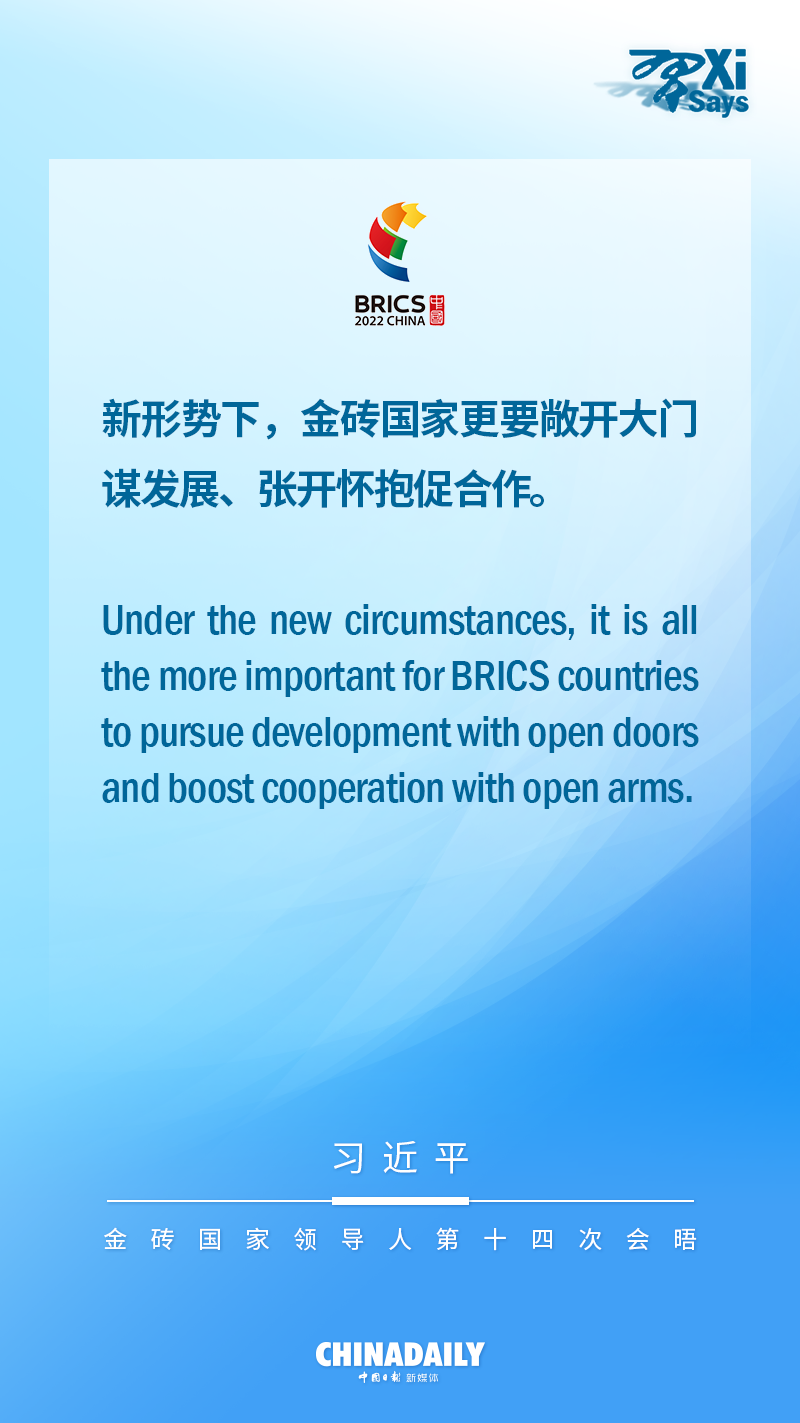
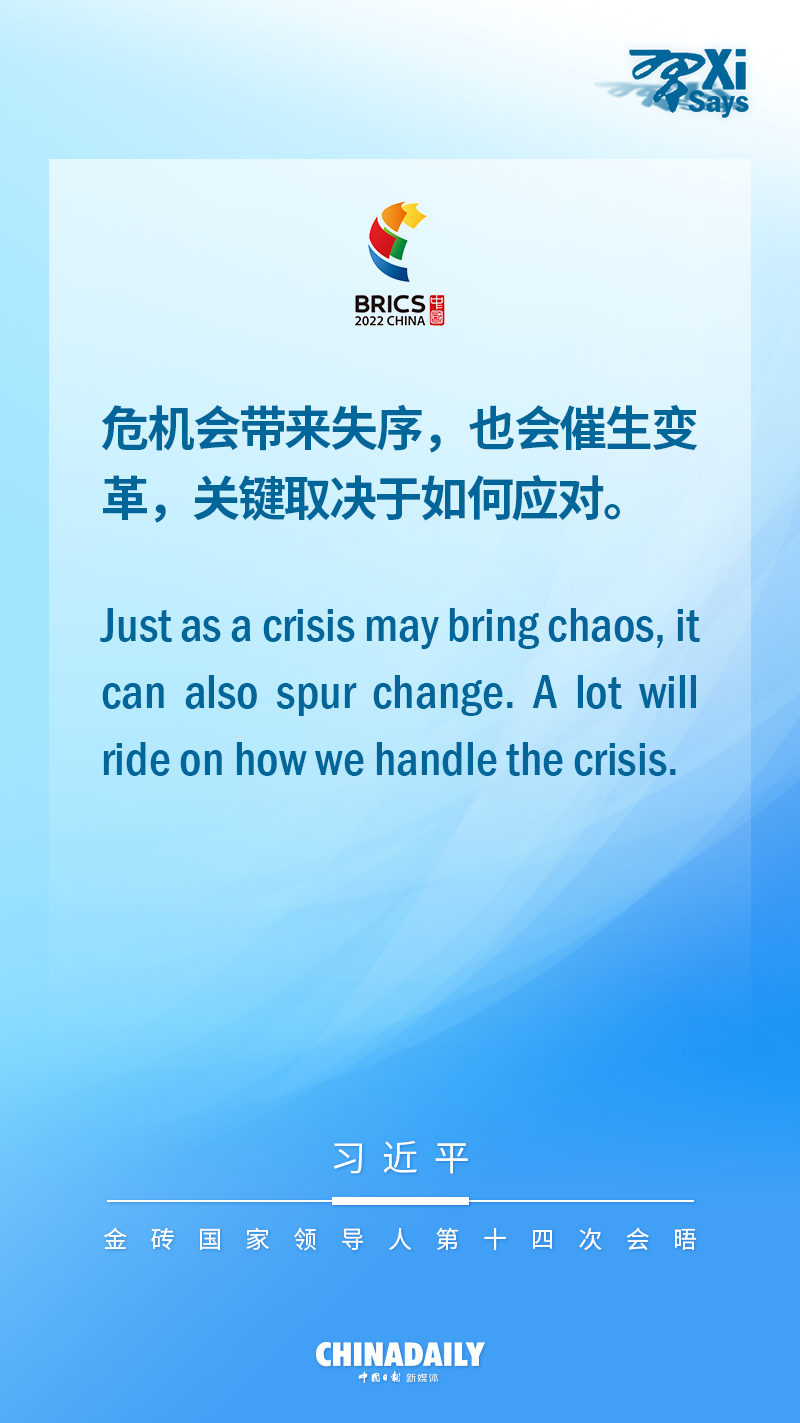
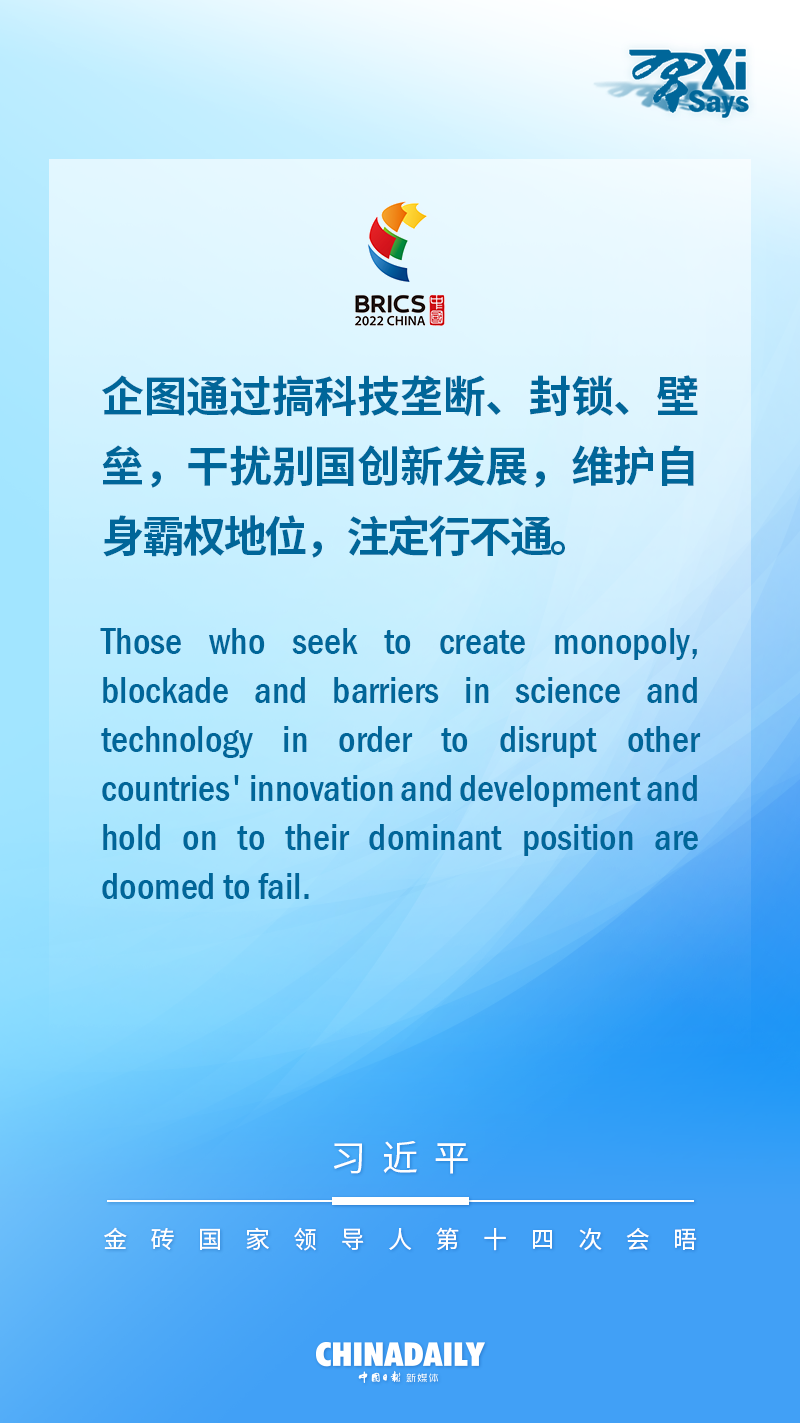
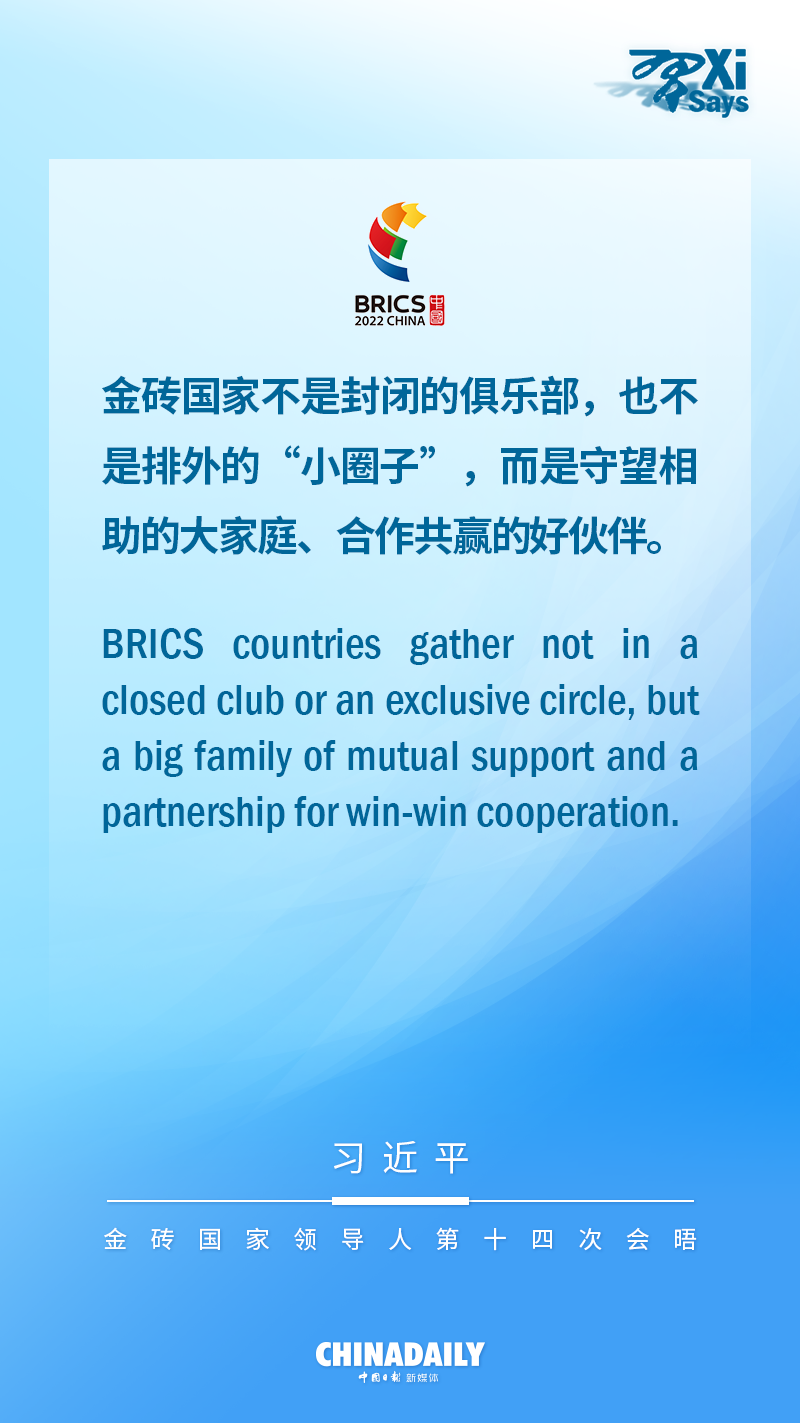
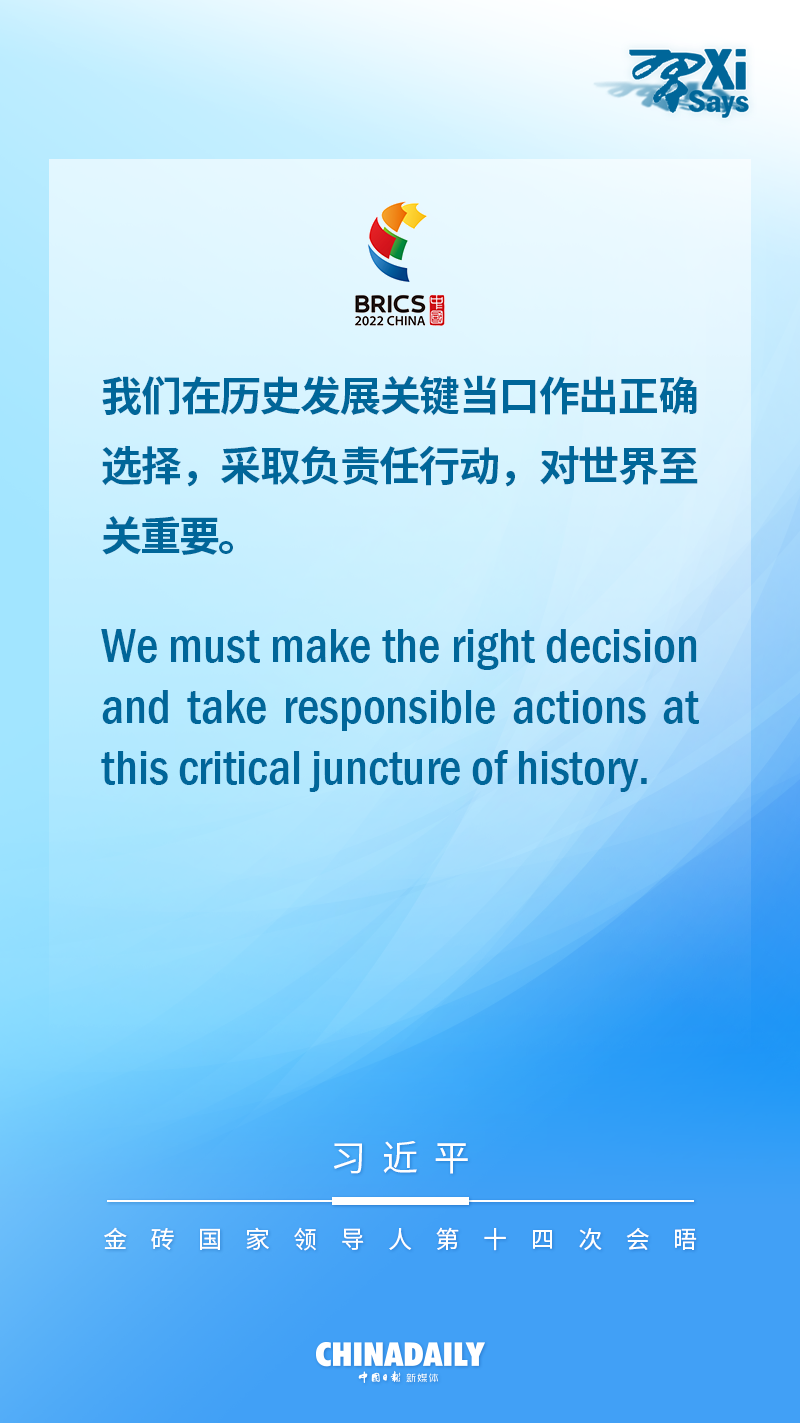
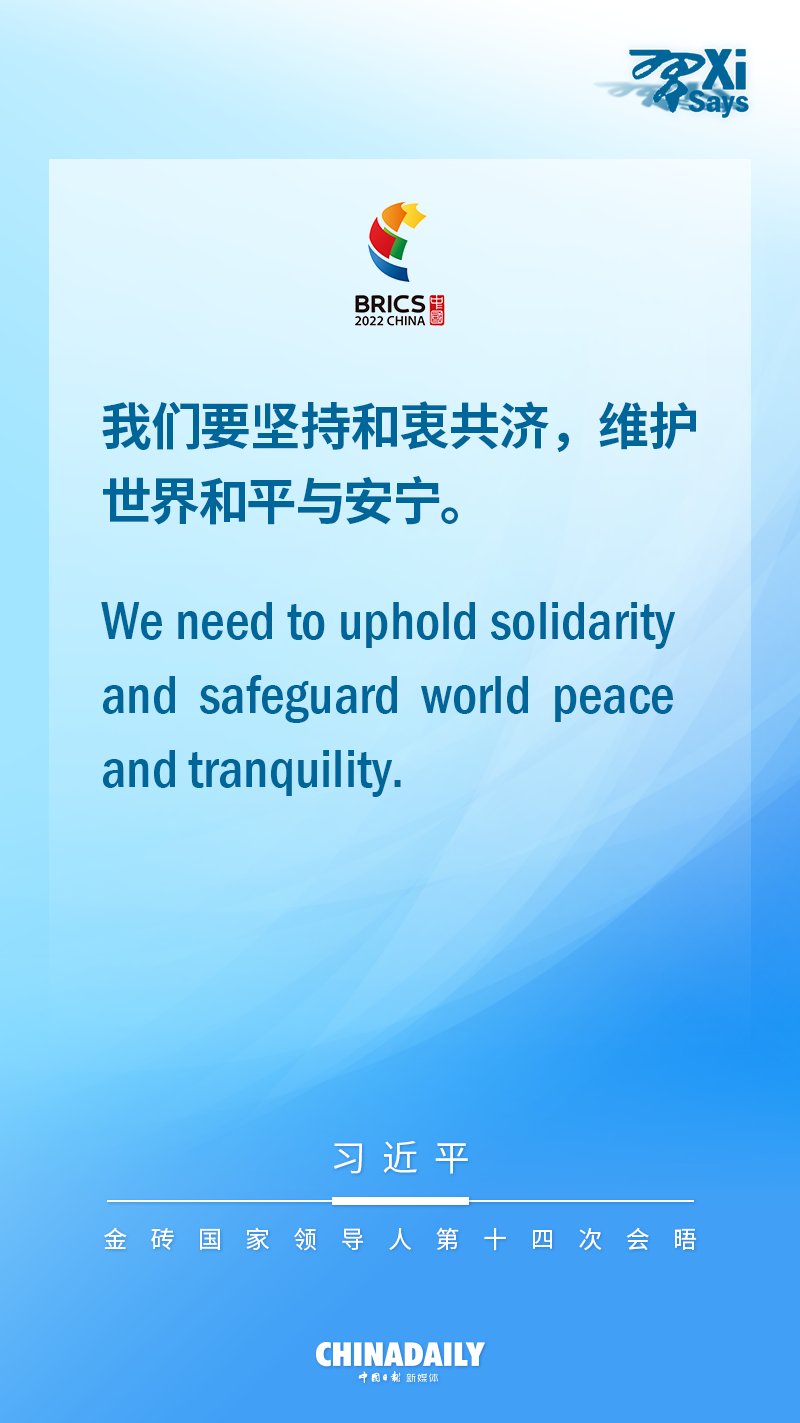
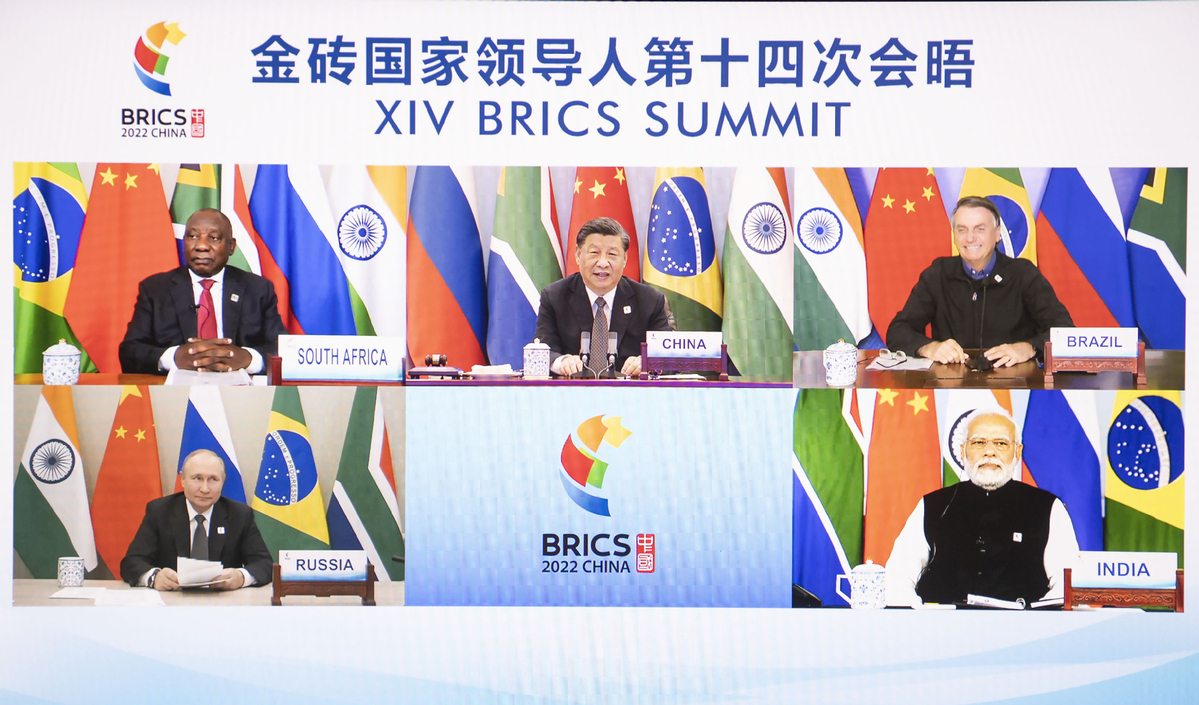
Brazil attaches enormous importance to cooperation among BRICS countries in areas such as economy and finance, trade, health and vaccines, science and technology, and the fight against terrorism and transnational crimes, said the nation's top envoy to Beijing.
Paulo Estivallet de Mesquita, the Brazilian ambassador to China, said the 14th BRICS Summit is "an opportunity to reaffirm our commitment to work together and to explore new fields for cooperation, addressing common challenges we face and bearing in mind the ultimate objective of promoting the well-being of our peoples".
The summit, hosted by Chinese President Xi Jinping via video link on Thursday, brings together leaders from Brazil, Russia, India and South Africa.
Mesquita said BRICS is a very relevant diplomatic mechanism that has shown its ability to adapt and respond to new challenges. "The intense dialogue BRICS countries have been keeping in the past 16 years allowed us to create an agenda of our own, which stems directly from our position as big developing countries from around the globe," he said.
He gave the example of the New Development Bank, which already holds a robust investment portfolio in areas such as sustainable infrastructure, urban development and clean energy, and included Bangladesh, Egypt, United Arab Emirates and Uruguay as its new members.
BRICS have also teamed up on vaccine research as the members jointly launched a BRICS Vaccine R&D Center in March.
The Brazilian envoy also spoke highly of ties between Brazil and China, saying that the last decade was "transformative" in bilateral relations. "We have achieved some extraordinary economic results and deepened our political dialogue," he said.
Trade between China and Brazil reached a historic high of $135 billion last year, and China has been Brazil's largest trading partner since 2009, and Brazil is China's third-largest trading partner in the West, after the United States and Germany.
Mesquita explained that Brazil is now China's main provider of food products, with about 20 percent of China's agricultural imports now coming from Brazil's agribusiness sector.
"Brazil is also a reliable provider of key commodities such as oil and iron ore, indispensable for China's development. In turn, Brazil has also benefited from imports of a range of different products from China," he said.
The two nations have also launched six satellites under the China-Brazil Earth Resources Satellite program, and both sides are already working on the next generation of satellites.
He added that China's vaccines and pharmaceutical sector have helped Brazil fight the COVID-19 pandemic, and the nation is eyeing closer links between Chinese and Brazilian tech companies.
"China is the second country in the world when it comes to the number of unicorns, while Brazil ranks ninth," he said.
"We want to further explore synergies in that area."
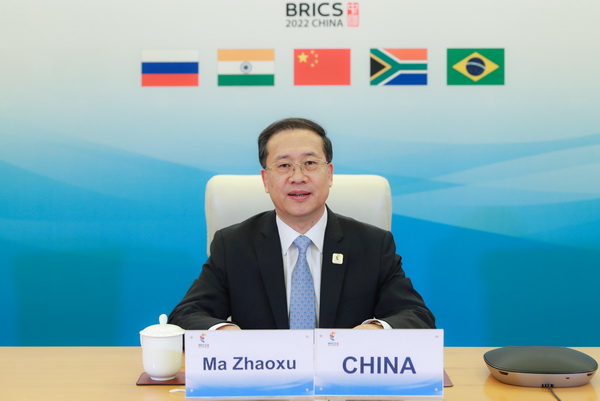
The 14th BRICS Summit hosted by China on Thursday "kicked off a new journey of BRICS cooperation and demonstrated the bright future of the BRICS mechanism", Vice-Foreign Minister Ma Zhaoxu said.
Ma made the comment at a briefing after the virtual summit that brought together leaders from five leading emerging economies — Brazil, Russia, China, India and South Africa.
The meeting on Thursday was very successful and could be said to be a milestone, Ma said.
Parties at the summit said that under the strong leadership of President Xi, China, as the BRICS chair country this year, has earnestly responded to complex situations, risks and challenges, and has achieved fruitful results in promoting BRICS cooperation, according to Ma.
These efforts "have deepened the strategic partnership of the BRICS countries, enhanced the influence of the BRICS countries, and made new contributions to maintaining world peace and promoting global development," Ma added.
The Thursday meeting passed the Beijing Declaration of the 14th BRICS Summit.
The summit "demonstrated the BRICS countries' commitment to major global international and regional issues such as multilateralism, international fairness and justice, cooperation on fight the pandemic, and the 2030 Agenda for Sustainable Development," Ma said.
At the same time, the summit brought together many achievements of BRICS pragmatic cooperation and made plans for the next stage of BRICS cooperation, he added.
The BRICS countries are an important symbol of the rise of developing countries, Ma said.
"The BRICS cooperation has gone through 16 years and has become a model of solidarity and cooperation among emerging market countries and developing countries," Ma said.
This year, China holds the chairmanship of the BRICS for its third time.
The "BRICS China Year" enjoys many highlights, as a number of practical cooperation results have been achieved in various fields such as global economic recovery, epidemic prevention and control, digital economy, sustainable development and cultural exchanges, Ma said.
It can be said that BRICS cooperation has reached a new level in terms of quantity and quality, he said.
"We have made Chinese contributions to promoting the high-quality development of the BRICS," he added.
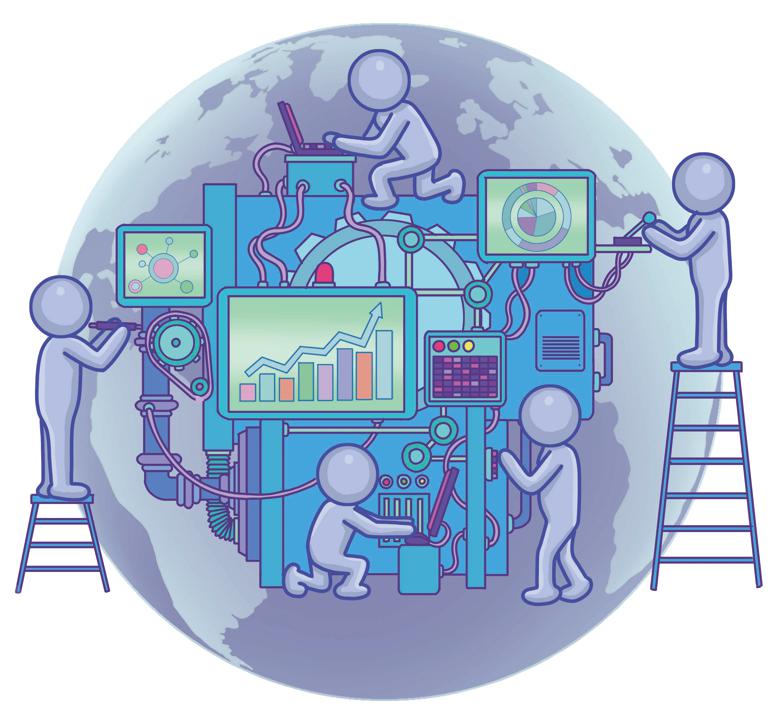
The COVID-19 pandemic had already dealt a massive blow to the world economy when the Russia-Ukraine conflict broke out. The conflict and the sanctions major developed economies announced against Russia in response have resulted in food, energy and refugee crises, dealing yet another powerful blow to the global economy apart from heightening the tensions between Russia and the West.
The energy and food crises have affected many countries across the world, especially developing countries, which depend heavily on food and energy imports. To deal with such serious global problems, countries need to work together.
In fact, they had done so after the 2008 global financial crisis broke out. But today, instead of joining hands to overcome the multiple crises, the United States and some other Western economies, caught in the vortex of anti-globalization, have abandoned their global outlook and are adopting more and more protectionist and unilateral trade and other policies.
Globalization, in essence, should be about free and fair global trade and cooperation. But the US and its allies wanted globalization to be fashioned on the lines of the colonial system devised by the West. That's why the US-led West controlled global organizations such as the International Monetary Fund, the World Bank and the World Trade Organization, in order to set almost all the global economic and commercial rules, and conspired to make the US dollar the default international currency.
But globalization didn't evolve according to their plan, as the contributions of emerging market and developing economies to global growth began increasing at rapid pace. In fact, the developed countries and their emerging market and developing counterparts have nearly the same share of the global economy today.
Realizing that they are increasingly losing their advantages in the global markets, the developed countries do not seem interested in boosting globalization any more. Instead, they are taking all sorts of anti-globalization and anti-WTO measures to protect their home industries and companies.
In such a scenario, it is the obligation of emerging market economies to uphold globalization and promote multilateralism, so countries from the Global South can boost their economic development and improve the lives of their peoples.
And BRICS, as a grouping of emerging market economies, is best suited to take this mission forward. Therefore, it is important that the five BRICS member states deepen cooperation within the bloc, as well as with other developing countries, in order to help the global economy to overcome the serious challenges the world faces today.
In fact, the 14th BRICS Summit, which concluded on Thursday and was themed "Foster High Quality BRICS Partnership, Usher in the New Era for Global Development", vowed to strengthen cooperation among the member states as well as with other developing countries to overcome the food and energy crises.
As an important BRICS member and the second-largest economy in the world, China has been increasingly contributing to global development and peace, and has promised to continue doing so. And the Global Development Initiative President Xi Jinping proposed at the 76th annual session of the United Nations General Assembly in September last year is a major step toward fulfilling that promise, for it will take forward the global development cause and help realize the UN's 2030 Agenda for Sustainable Development.
Beijing is hosting three events this week which are expected to boost BRICS cooperation. The series of events started with the BRICS Business Forum on Wednesday and was followed by the 14th BRICS Summit on Thursday, and will conclude with the High-level Dialogue on Global Development on Friday. That more than 1,000 officials, diplomats and business representatives from 18 countries attended the business forum shows it has drawn attention from not only BRICS but also beyond.
Addressing the business forum via video link, President Xi said countries need to work together to steer global development into a new era to tackle the challenges facing the world and improve people's well-being. Emphasizing that people around the world are worried about the unending challenges facing the global economy, Xi urged all countries to work together to create mutual benefits by pursuing common development.
Besides, at the Meeting of BRICS Ministers of Foreign Affairs on May 19, the member states reiterated their commitment to adhere to multilateralism, uphold international law and the United Nations Charter, promote reform of the global governance system, and build a fairer, and more equitable and inclusive international architecture.
And to integrate into globalization, all countries must abide by international laws and the UN Charter, and the US-led West, instead of trying to reshape the world order to maintain their advantages, should work with other countries to build a better future for all.
The author is deputy secretary general of the Center for One Belt One Road, Chinese Academy of Social Sciences.
The views don't necessarily reflect those of China Daily.
If you have a specific expertise, or would like to share your thought about our stories, then send us your writings at [email protected], and [email protected].
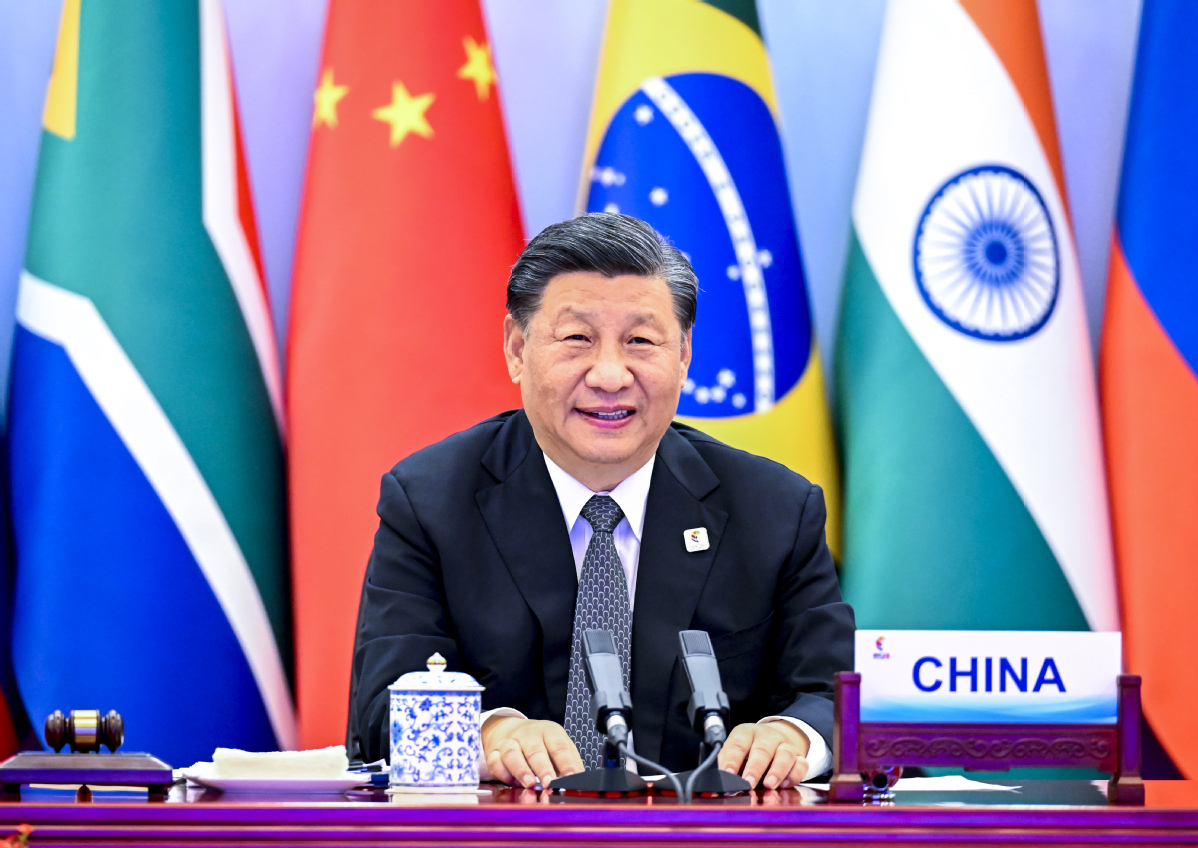
President calls on member countries to safeguard peace, promote stability
President Xi Jinping has urged the BRICS countries to support one another on issues concerning their core interests, practice true multilateralism, and work together to safeguard justice, fairness and solidarity and reject hegemony, bullying and division.
Xi made the remark while chairing the 14th BRICS Summit via video link in Beijing. BRICS, which groups Brazil, Russia, India, China and South Africa, represents the world's emerging markets and major developing countries.
Saying that the world today is overshadowed by the dark clouds of Cold War mentality and power politics and beset by constantly emerging traditional and nontraditional security threats, Xi called on the BRICS countries to uphold solidarity and safeguard world peace and tranquillity.
"Some countries attempt to expand military alliances to seek absolute security, stoke bloc-based confrontation by coercing other countries into picking sides, and pursue unilateral dominance at the expense of others' rights and interests. If such dangerous trends are allowed to continue, the world will witness even more turbulence and insecurity," he said.
Xi said that BRICS countries need to act with a sense of responsibility to bring positive, stabilizing and constructive strength to the world.
He underlined the need to reject Cold War mentality and bloc confrontation, oppose unilateral sanctions and abuse of sanctions, and reject hegemony's small circles by forming one big family belonging to a community with a shared future for mankind.
China is willing to work with BRICS partners to operationalize the Global Security Initiative, which advocates a vision of common, comprehensive, cooperative and sustainable security, and bring more stability and positive energy to the world, Xi said.
Noting that the combination of the COVID-19 pandemic and the Ukraine crisis has resulted in disruptions to global industrial and supply chains, sustained increases in commodity prices and weaker international monetary and financial systems, Xi underlined the need for the BRICS countries to strengthen cooperation to boost development and jointly tackle risks and challenges.
He called for enhancing international cooperation on the COVID-19 response, pooling strength for economic recovery, stepping up macro policy coordination and keeping industrial and supply chains secure and unclogged.
China stands ready to work with BRICS partners to add more substance to the Global Development Initiative, which aims to re-energize the implementation of the United Nations' 2030 Agenda for Sustainable Development, and contribute to stronger, greener and healthier global development, Xi said.
He criticized some countries that seek to create monopolies, blockades and barriers in science and technology in order to disrupt others' innovation and development and hold on to their dominant position, saying their attempts are doomed to fail.
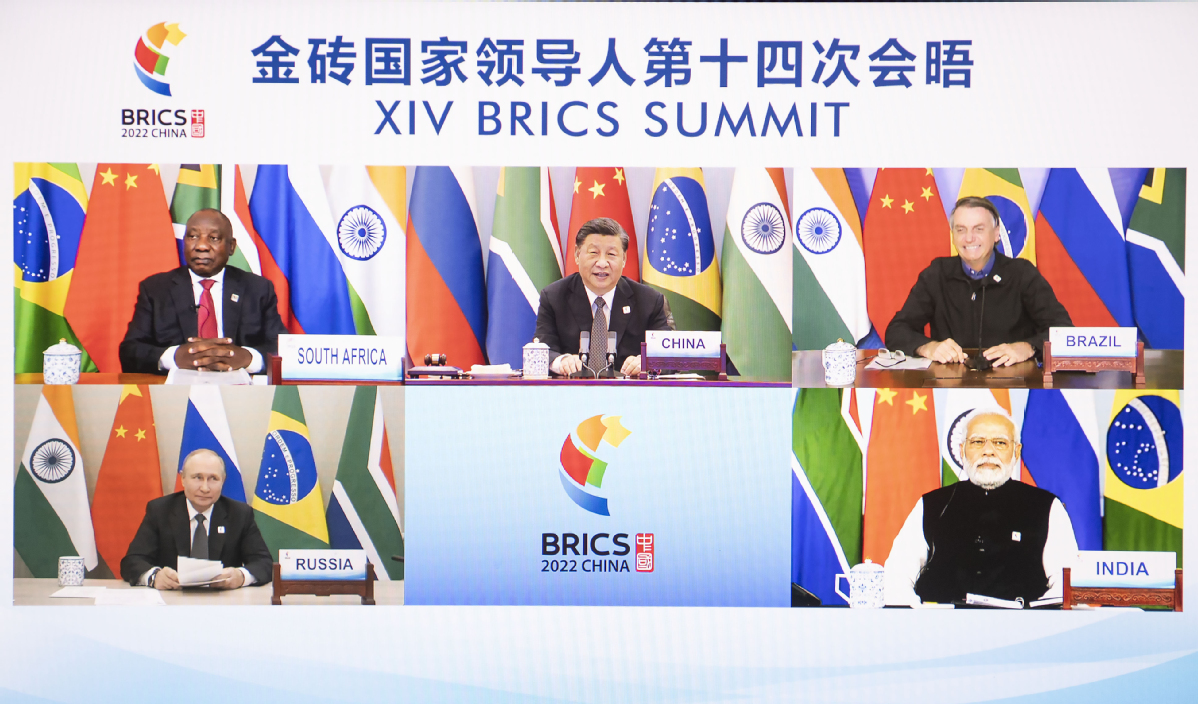
While stressing the need to build an open world economy, Xi also emphasized the importance of forestalling and defusing major risks and challenges in global development and working for more inclusive and resilient economic growth.
He underlined the importance of developing the "BRICS Plus" cooperation approach, and called for advancing this process to allow like-minded partners to become part of the BRICS family at an early date.
The summit, with the theme "Fostering High-quality Partnership and Ushering in a New Era of Global Development", came at a time when the world is facing the continued spread of COVID-19, tortuous global economic recovery and increasingly salient peace and security issues.
Brazilian President Jair Bolsonaro, Russian President Vladimir Putin, Indian Prime Minister Narendra Modi and South African President Cyril Ramaphosa joined Xi for the virtual summit.
The leaders exchanged views on BRICS cooperation in various fields as well as other major issues of common concern and reached broad consensus. They agreed that BRICS countries should uphold multilateralism, advance the democratization of global governance and safeguard international fairness and justice, in order to inject stability and positive energy into the volatile international situation.
While agreeing to bolster cooperation in various areas, including the COVID-19 response, they pledged to firmly uphold the multilateral trading system, advance the building of an open world economy and oppose unilateral sanctions and "long-arm jurisdiction".
The summit adopted a declaration to build a stronger BRICS partnership.
While addressing the summit, Bolsonaro voiced his hope that the BRICS nations will have a greater role in key international organizations at a time when emerging economies and developing countries are accounting for an increasing proportion of the global economy.
Putin said that some countries currently follow erroneous economic policies, and they are making other countries pay the price for their mistakes. The BRICS nations need to bolster unity and make a greater joint effort to tackle difficulties, he added.
Modi, noting that COVID-19 has had a huge impact on the global community, said the BRICS nations face similar challenges, and their stronger collaboration will make a key contribution to the world's recovery from the pandemic.
Ramaphosa said that the five BRICS nations represent the world's emerging economies, and they should seize the opportunity to boost collaboration. He noted that, as China holds the BRICS chairmanship this year, the group has held its first high-level meeting on climate change and made global development more inclusive and sustainable.
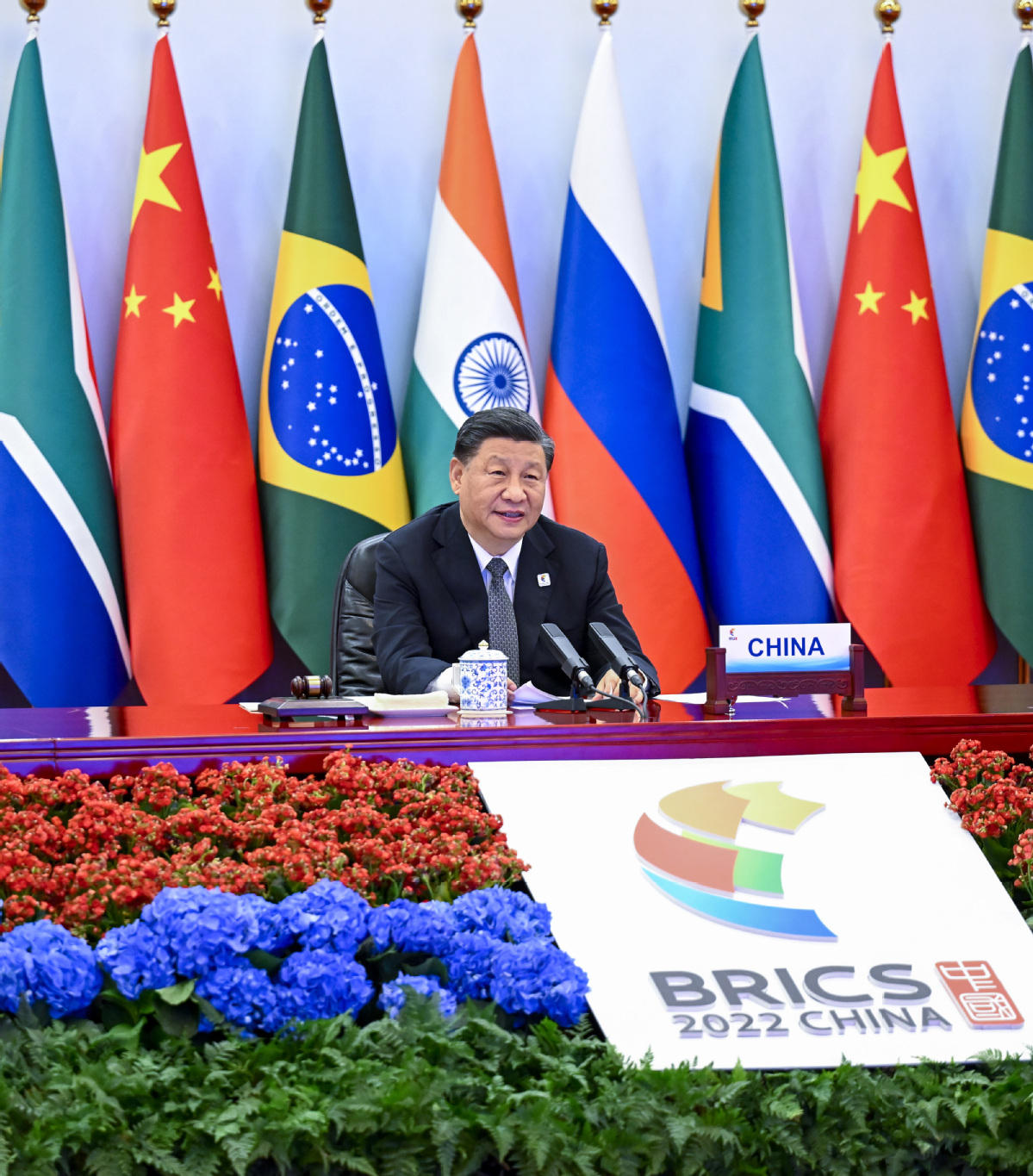
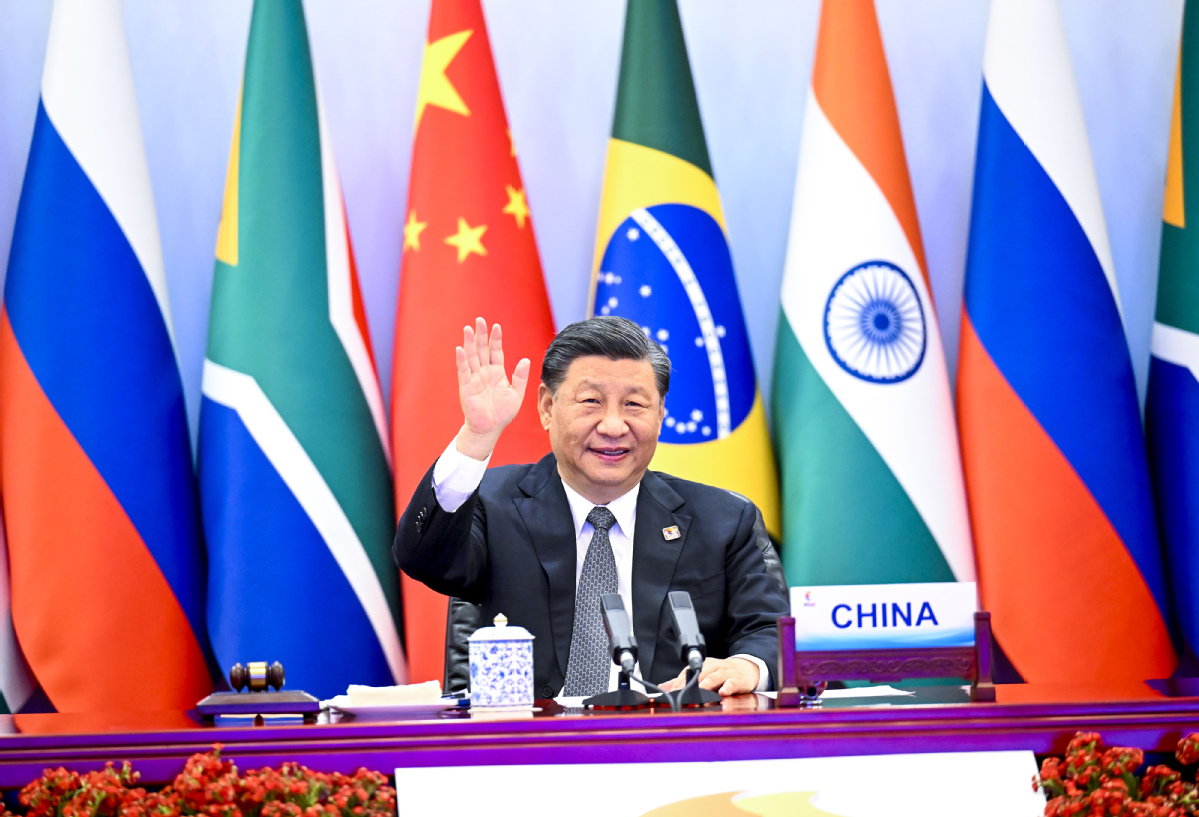
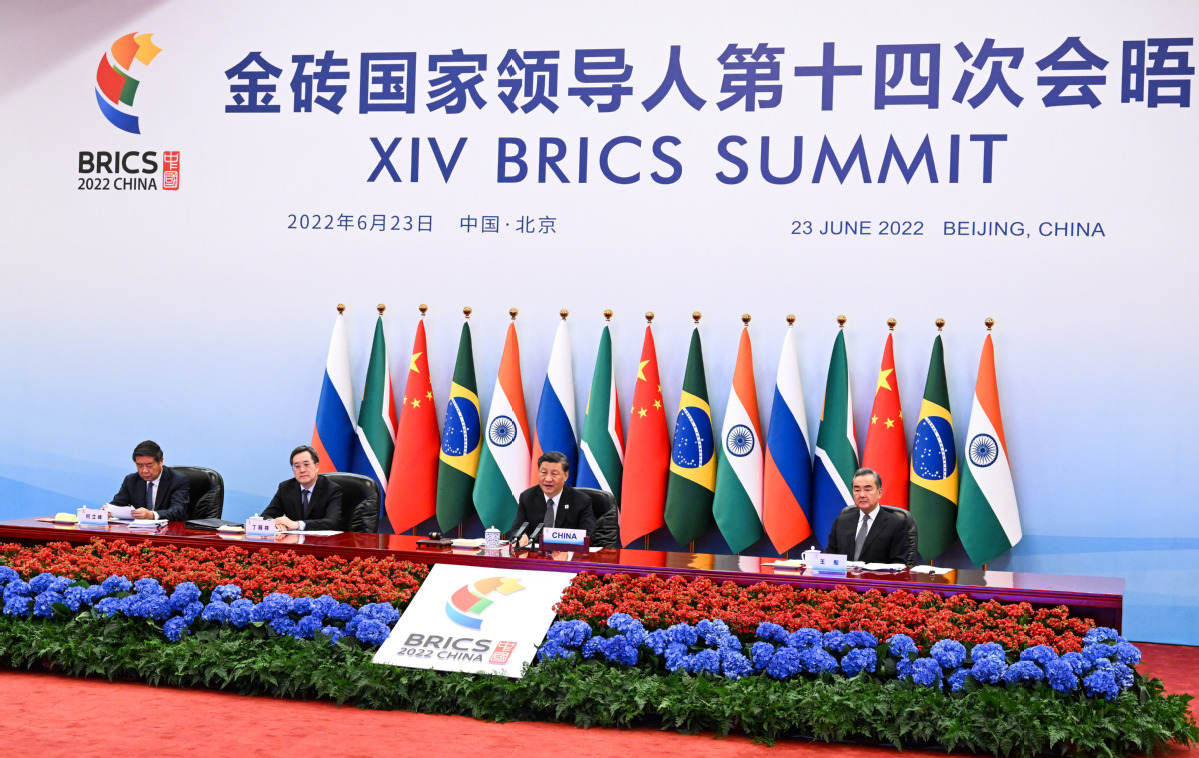
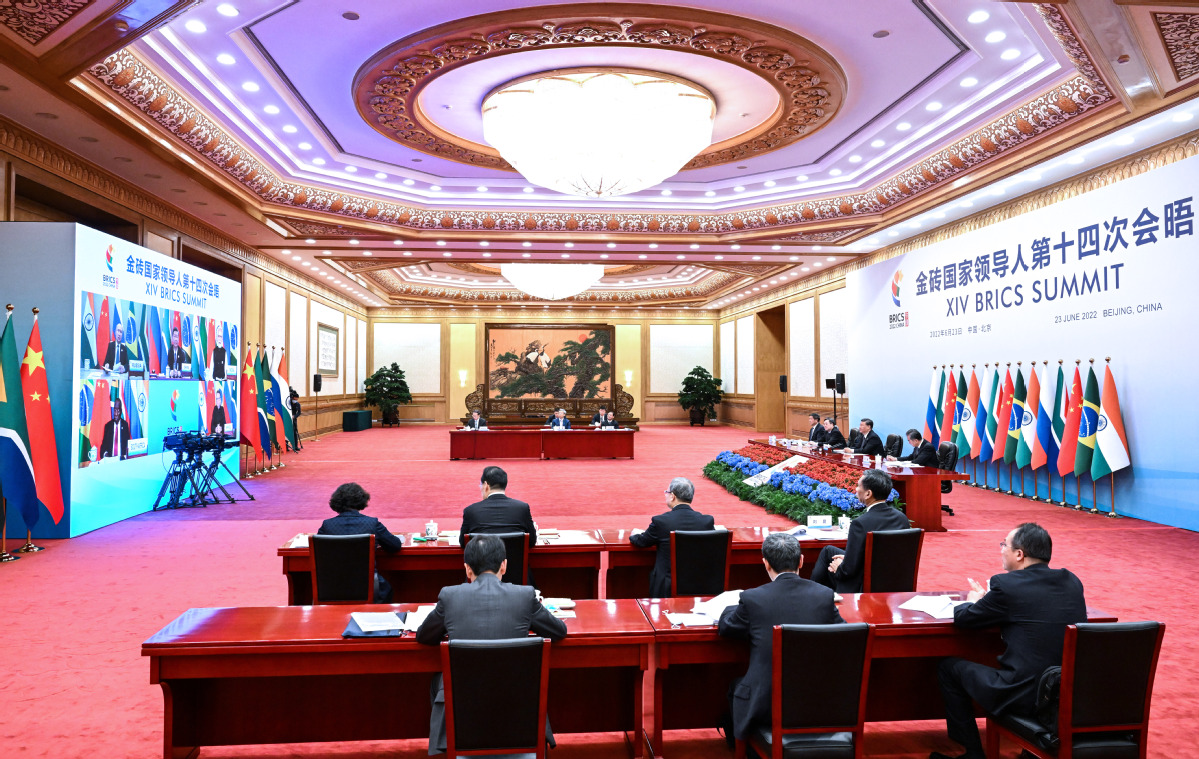
BEIJING - The 14th BRICS Summit on Thursday issued the Beijing Declaration.
Following is the full text of the declaration.
XIV BRICS Summit Beijing Declaration
Preamble
1. We, the Leaders of the Federative Republic of Brazil, the Russian Federation, the Republic of India, the People's Republic of China and the Republic of South Africa held the XIV BRICS Summit under the theme "Foster High-quality BRICS Partnership, Usher in a New Era for Global Development" on 23-24 June 2022.
2. We recall that in the past 16 years, upholding the BRICS spirit featuring mutual respect and understanding, equality, solidarity, openness, inclusiveness, and consensus, BRICS countries have strengthened mutual trust, deepened intra-BRICS mutually beneficial cooperation, and closer people-to-people exchanges, which has led to a series of significant outcomes. We reiterate the importance of further enhancing BRICS solidarity and cooperation based on our common interests and key priorities, to further strengthen our strategic partnership.
3. We are glad to note that despite the COVID-19 pandemic and other challenges, BRICS countries in 2022 have jointly continued enhancing solidarity and deepening cooperation on, inter alia, economy, peace and security, people-to-people exchanges, public health, and sustainable development by holding a series of meetings and activities, and contributed to tangible outcomes of BRICS cooperation.
4. We welcome the High-level Dialogue on Global Development at this Summit as a testimony to the open and inclusive nature of BRICS Partnership including BRICS Outreach/BRICS Plus cooperation. We look forward to the Dialogue injecting new impetus to strengthen international cooperation and solidarity on implementing the 2030 Agenda for Sustainable Development.
Strengthening and Reforming Global Governance
5. We reiterate our commitment to multilateralism through upholding international law, including the purposes and principles enshrined in the Charter of the United Nations as its indispensable cornerstone, and to the central role of the United Nations in an international system in which sovereign states cooperate to maintain peace and security, advance sustainable development, ensure the promotion and protection of democracy, human rights and fundamental freedoms for all, and promoting cooperation based on the spirit of mutual respect, justice and equality.
6. Recalling the BRICS Joint Statement on Strengthening and Reforming the Multilateral System adopted by our Foreign Ministers in 2021 and the principles outlined therein, we agree that the task of strengthening and reforming multilateral system encompasses the following:
-Making instruments of global governance more inclusive, representative and participatory to facilitate greater and more meaningful participation of developing and least developed countries, especially in Africa, in global decision-making processes and structures and make it better attuned to contemporary realities;
-Being based on inclusive consultation and collaboration for the benefit of all, while respecting sovereign independence, equality, mutual legitimate interests and concerns to make the multilateral organizations more responsive, effective, transparent and credible;
-Making multilateral organizations more responsive, effective, transparent, democratic, objective, action-oriented, solution-oriented and credible, so as to promote cooperation in building international relations based on the norms and principles of international law, and the spirit of mutual respect, justice, equality, mutual beneficial cooperation and realities of the contemporary world;
-Using innovative and inclusive solutions, including digital and technological tools to promote sustainable development and facilitate affordable and equitable access to global public goods for all;
-Strengthening capacities of individual States and international organizations to better respond to new and emerging, traditional and non-traditional challenges, including those emanating from terrorism, money laundering, cyber-realm, infodemics and fake news;
-Promoting international and regional peace and security, social and economic development, and preserve nature's balance with people-centered international cooperation at its core.
7. We recall the UNGA Resolution 75/1 and reiterate the call for reforms of the principal organs of the United Nations. We recommit to instill new life in the discussions on reform of the UN Security Council and continue the work to revitalize the General Assembly and strengthen the Economic and Social Council. We recall the 2005 World Summit Outcome document and reaffirm the need for a comprehensive reform of the UN, including its Security Council, with a view to making it more representative, effective and efficient, and to increase the representation of the developing countries so that it can adequately respond to global challenges. China and Russia reiterated the importance they attach to the status and role of Brazil, India and South Africa in international affairs and supported their aspiration to play a greater role in the UN.
8. We appreciate the role of India and Brazil as members of the UN Security Council for 2021-2022 and 2022-2023 respectively. The presence of four BRICS countries in the UN Security Council provides an opportunity to further enhance the weight of our dialogue on issue of international peace and security and for continued cooperation in areas of mutual interest, including through regular exchanges amongst our permanent Mission to the United Nations and in other international fora.
9. We reiterate the need for all countries to cooperate in promoting and protecting human rights and fundamental freedoms under the principles of equality and mutual respect. We agree to continue to treat all human rights including the right to development in a fair and equal manner, on the same footing and with the same emphasis. We agree to strengthen cooperation on issues of common interests both within BRICS and in multilateral fora including the United Nations General Assembly and Human Rights Council, taking into account the necessity to promote, protect and fulfil human rights in a non-selective, non-politicised and constructive manner and without double standards. We call for the respect of democracy and human rights. In this regard, we underline that they should be implemented on the level of global governance as well as at national level. We reaffirm our commitment to ensuring the promotion and protection of democracy, human rights and fundamental freedoms for all with the aim to build a brighter shared future for the international community based on mutually beneficial cooperation.
10. We stress that global economic governance is of critical importance for countries to ensure sustainable development and recall further our support for broadening and strengthening the participation of emerging markets and developing countries (EMDCs) in the international economic decision-making and norm-setting processes. We reiterate our support for G20's leading role in global economic governance and underline that G20 shall remain intact and respond to current global challenges. We call upon the international community to foster partnerships while underlining that it is imperative to strengthen macro-policy coordination in driving the world economy out of the crisis and shaping a strong, sustainable, balanced and inclusive post-pandemic economic recovery. We urge major developed countries to adopt responsible economic policies, while managing policy spillovers, to avoid severe impacts on developing countries.
11. We reaffirm our support for an open, transparent, inclusive, non-discriminatory and rules-based multilateral trading system, as embodied in the World Trade Organization(WTO). We will engage constructively to pursue the necessary WTO reform to build an open world economy that supports trade and development, preserve the pre-eminent role of the WTO for setting global trade rules and governance, supporting inclusive development and promoting the rights and interests of its members, including developing members and LDCs. We recognize that special and differential treatment as established in WTO rules is a tool to facilitate the achievement of WTO objectives with respect to economic growth and development. We call upon all WTO members to avoid unilateral and protectionist measures that run counter to the spirit and rules of the WTO. We emphasize the top priority and urgency of launching the selection process of the Appellate Body members to restore the binding two-tier multilateral dispute settlement mechanism. We agree that the Appellate Body crisis should be resolved without further delay and should not be linked with other issues. We endorse BRICS Statement on Strengthening the Multilateral Trading System and Reforming the WTO. We commend the successful conclusion of MC12 that underscores the value of multilateralism. We encourage WTO members to sustain momentum and achieve further meaningful outcomes by MC13.
12. We reaffirm our commitment to maintaining a strong and effective Global Financial Safety Net with a quota-based and adequately resourced IMF at its center. We call for the timely and successful completion of the 16th General Review of Quotas by 15 December 2023, to reduce the IMF's reliance on temporary resources, to address under-representation of emerging markets and developing countries (EMDCs) for their meaningful engagement in the governance of IMF and protect the voice and quota shares of the poorest and smallest members. We welcome progress on voluntary channeling of Special Drawing Rights (SDRs) from countries with strong external positions to support countries most in need, as well as the IMF's decision to establish the Resilience and Sustainability Trust (RST). We look forward to early operationalization of the RST.
13. We note that the COVID-19 pandemic has caused serious shock and hardship to humanity, unbalanced recovery is aggravating inequality across the world, the global growth momentum has weakened, and the economic prospects have declined. We are concerned that global development is suffering from severe disruption, including the widening North-South development gap, divergent recovery trajectories, pre-existing developmental fault-lines and a technological divide. This is posing huge challenges to the implementation of the 2030 Agenda for Sustainable Development as economic and health scarring, particularly for EMDCs, is projected to persist beyond the current pandemic. We urge major developed countries to adopt responsible economic policies, while managing policy spillovers, to avoid severe impacts on developing countries. We encourage multilateral financial institutions and international organizations to play a constructive role in building global consensus on economic policies and preventing systemic risks of economic disruption and financial fragmentation. We welcome the actions to accelerate the progress towards achieving the 2030 Agenda for Sustainable Development.
Working in Solidarity to Combat COVID-19
14. We reiterate that it was imperative to ensure the availability of safe, efficacious, accessible and affordable diagnostics, medicines, vaccines and essential medical products to people from different countries especially developing countries, and equitable distribution of vaccines and expeditious vaccination, to fill the immunization gap globally. We support the leading role of the WHO in combating the pandemic, as well as acknowledge initiatives such as the COVAX and the ACT-A. We recognize the importance of the discussions in the WTO on relevant IP waiver proposals, as well as capacity building and strengthening local production of vaccines and other health tools, especially in developing countries. We stress the need to continue to strengthen the cooperation on testing methods, therapeutic, research, production and recognition of vaccines, the research on their efficacy and safety in light of new variants of COVID-19 virus and recognition of national document of vaccination against COVID-19 and respective testing, especially for purpose of international travel.
15. We reaffirm our commitment to multilateralism and continue to support World Health Organization (WHO) to play the leading role in the global health governance, while supporting other UN relevant agencies' activities. The BRICS countries will strengthen technical multilateral cooperation aimed at enhancing capacities in the fields of responding to major public health emergencies, Universal Health Coverage (UHC), vaccine research and development, prevention & therapeutic health care and digital health systems. We agree to deepen existing cooperation through establishing closer cooperation ties among BRICS health institutions and exploring opportunities for joint collaborative projects in the health sector.
16. We welcome the convening of the BRICS High-Level Forum on Traditional Medicine.
17. We stress that BRICS countries should be better prepared for COVID-19 and future public health emergencies, and enhance exchanges and cooperation on public health emergency alert, pandemic prevention preparedness and response, and best practices in medical treatment. We welcome the virtual launch of the BRICS Vaccine Research and Development Center and commend the "Initiative on Strengthening Vaccine Cooperation and Jointly Building a Defensive Line against Pandemic". We welcome the participation of other countries, especially EMDCs, in the Center to upgrade capacity for controlling and preventing infectious diseases. We support and emphasize the urgent need for the establishment of the BRICS Integrated Early Warning System for preventing mass infectious diseases risks in accordance with the International Health Regulations (2005) and the WHO's Global Outbreak Alert and Response Network, and emphasize that BRICS countries should jointly take proactive and effective measures to prevent and reduce the risk of cross-border transmission of infectious diseases and contribute to improving global health.
18. We support continuing to hold the BRICS TB Research Network Meetings, which will contribute to achieving the WHO goal of ending TB by 2030. We support the early signing of the Memorandum of Understanding on Cooperation in the Field of Regulation of Medical Products for Human Use among our drug regulatory authorities and welcome the holding of a BRICS Seminar of Officials and Experts in Population Development in the second half of 2022.
19. We call on international agencies and philanthropists to procure vaccines and boosters from manufacturers in developing countries, including in Africa, to ensure that the manufacturing capabilities being developed are retained. This is critical to build health system resilience and preparedness for emerging variants and any future health emergencies including pandemics. In this context access to diagnostics and therapeutics is essential to adopt quality and affordable medical countermeasures and develop overall surveillance capabilities.
Safeguarding Peace and Security
20. We welcome the BRICS Joint Statement on "Strengthen BRICS Solidarity and Cooperation, Respond to New Features and Challenges in International Situation" adopted by our Foreign Ministers on 19 May 2022, and the 12th Meeting of BRICS National Security Advisers and High Representatives on National Security, held on 15 June 2022, and commend their fruitful discussions on various strategic issues.
21. We commit to respect the sovereignty and territorial integrity of all States, stress our commitment to the peaceful resolution of differences and disputes between countries through dialogue and consultation, support all efforts conducive to the peaceful settlement of crises.
22. We have discussed the situation in Ukraine and recall our national positions as expressed at the appropriate fora, namely the UNSC and UNGA. We support talks between Russia and Ukraine. We have also discussed our concerns over the humanitarian situation in and around Ukraine and expressed our support to efforts of the UN Secretary-General, UN Agencies and ICRC to provide humanitarian assistance in accordance with the basic principles of humanity, neutrality and impartiality established in UN General Assembly resolution 46/182.
23. We strongly support a peaceful, secure and stable Afghanistan while emphasizing the respect for its sovereignty, independence, territorial integrity, national unity and non-interference in its internal affairs. We emphasize the need for all sides to encourage the Afghanistan authorities to achieve national reconciliation through dialogue and negotiation, and to establish a broad-based and inclusive and representative political structure. We reaffirm the significance of relevant UNSC resolutions. We emphasize that the Afghan territory not to be used to threaten or attack any country or to shelter or train terrorists, or to plan to finance terrorist acts, and reiterate the importance of combating terrorism in Afghanistan. We call on the Afghanistan authorities to work towards combating drug-related crime to free Afghanistan from the scourge of drugs. We stress the need to provide urgent humanitarian assistance to the Afghan people and to safeguard the fundamental rights of all Afghans, including women, children, and different ethnic groups.
24. We reiterate the need to resolve the Iranian nuclear issue through peaceful and diplomatic means in accordance with the international law, and stress the importance of preserving the JCPOA and the UNSCR 2231 to international non-proliferation as well as wider peace and stability and hope for success of diplomatic efforts towards the resumption of the JCPOA.
25. We express our support for negotiations in bilateral and multilateral formats to resolve all issues pertaining to the Korean Peninsula, including its complete denuclearization, and maintaining peace and stability in Northeast Asia. We reaffirm the commitment to a comprehensive peaceful, diplomatic and political solution to the situation.
26. We reaffirm our commitment to a peaceful and prosperous Middle East and North Africa. We stress the importance of addressing development and security challenges in the region. We call on the international community to support efforts aimed at the stability and peace in the region.
27. We commend efforts of African countries, the African Union and sub-regional organizations to address regional challenges, including maintaining peace and security, post conflict reconstruction as well as development efforts, and call for continued support by the international community to them. We emphasize the collaboration of AU and UN in accordance with the UN Charter.
28. We call for continued efforts to strengthen the system of arms control, disarmament and non-proliferation treaties and agreements and to preserve its integrity for maintaining global stability and international peace and security, and stressed further the need to maintain the effectiveness and efficiency as well as the consensus-based nature of the relevant multilateral instruments in the field of disarmament, non-proliferation and arms control.
29. We call for strengthening the system of arms control, disarmament and non-proliferation, including the Convention on the Prohibition of the Development, Production and Stockpiling of Bacteriological (Biological) and Toxin Weapons and on their Destruction (BTWC) and the Convention on the Prohibition of the Development, Production, Stockpiling and Use of Chemical Weapons and on Their Destruction (CWC), and for preserving their integrity and effectiveness to maintain global stability and international peace and security. We underline the need to comply with and strengthen the BTWC, including by adopting a legally binding Protocol to the Convention that provides for, inter alia, an efficient verification mechanism. We reassert our support for ensuring the long-term sustainability of outer space activities and prevention of an arms race in outer space (PAROS) and of its weaponization, including through negotiations to adopt a relevant legally binding multilateral instrument. We recognize the value of the updated Draft Treaty on the Prevention of the Placement of Weapons in Outer Space, the Threat or Use of Force against Outer Space Objects (PPWT) submitted to the Conference on Disarmament in 2014. We stress that practical Transparency and Confidence-Building Measures (TCBMs), may also contribute to PAROS.
30. We reaffirm our commitment to a world free of nuclear weapons and stress our strong commitment to nuclear disarmament and our support to the work on this subject during the session of 2022 of the Conference on Disarmament. We note the Joint Statement of the Leaders of the People's Republic of China, the French Republic, the Russian Federation, the United Kingdom of Great Britain and Northern Ireland, and the United States on Preventing Nuclear War and Avoiding Arms Races on 3 January 2022, in particular the affirmation that a nuclear war cannot be won and must never be fought.
31. We reaffirm our commitment to the promotion of an open, secure, stable, accessible and peaceful ICT-environment, underscored the importance of enhancing common understandings and intensifying cooperation in the use of ICTs and Internet. We support the leading role of the United Nations in promoting constructive dialogue on ensuring ICT-security, including within the UN Open-Ended Working Group on security of and in the use of ICTs 2021-2025, and developing a universal legal framework in this realm. We call for a comprehensive, balanced, objective approach to the development and security of ICT products and systems. We underscore the importance of establishing legal frameworks of cooperation among BRICS countries on ensuring security in the use of ICTs. We also acknowledge the need to advance practical intra-BRICS cooperation through implementation of the BRICS Roadmap of Practical Cooperation on ensuring security in the use of ICTs and the activities of the BRICS Working Group on security in the use of ICTs.
32. We, while emphasizing the formidable potential of the ICTs for growth and development, recognize new associated possibilities they bring for criminal activities and threats, and expressed concern over the rising level and complexity of criminal misuse of ICTs. We welcome the ongoing work in the UN Open-Ended Ad Hoc Committee of Experts to elaborate a comprehensive international convention on countering the use of ICTs for criminal purposes and reaffirm our commitment to cooperating in the implementation of the mandate adopted by the UN General Assembly resolution 75/282.
33. We express strong condemnation of terrorism in all its forms and manifestations whenever, wherever and by whomsoever committed. We recognize the threat emanating from terrorism, extremism conducive to terrorism and radicalization. We are committed to combating terrorism in all its forms and manifestations, including the cross-border movement of terrorists, and terrorism financing networks and safe havens. We reiterate that terrorism should not be associated with any religion, nationality, civilization or ethnic group. We reaffirm our unwavering commitment to contribute further to the global efforts of preventing and countering the threat of terrorism on the basis of respect for international law, in particular the Charter of the United Nations, and human rights, emphasizing that States have the primary responsibility in combating terrorism with the United Nations continuing to play central and coordinating role in this area. We also stress the need for a comprehensive and balanced approach of the whole international community to effectively curb the terrorist activities, which pose a serious threat, including in the present-day pandemic environment. We reject double standards in countering terrorism and extremism conducive to terrorism. We call for an expeditious finalization and adoption of the Comprehensive Convention on International Terrorism within the UN framework and for launching multilateral negotiations on an international convention for the suppression of acts of chemical and biological terrorism, at the Conference of Disarmament. We welcome the outcomes of the Seventh BRICS Counter-Terrorism Working Group Plenary Meeting and its five Subgroup Meetings. We commend the Chair for hosting the Seminar on Targeted Financial Sanctions Related to Terrorism and Terrorist Financing, and look forward to organization of the Seminar on Strengthening Counter-Terrorism Capacity Building in Developing Countries, and the BRICS Police Training Program. We also look forward to further deepening counter-terrorism cooperation.
34. We look forward to further deepening counter-terrorism cooperation and reaffirm the sole authority of the UN Security Council for imposing sanctions and call for further consolidation and strengthening of the working methods of UN Security Council Sanctions Committees to ensure their effectiveness, responsiveness and transparency, while avoiding politicization of any of their proceedings including listing proposals objectively on evidence-based criteria.
35. We reaffirm our commitment to strengthening international cooperation against corruption. While respecting the legal systems of our respective countries, we are committed to strengthening experience sharing and practical cooperation on issues related to anti-corruption law enforcement, including on pursuit of economic and corruption offenders, on mutual legal assistance in civil and administrative matters, and on asset recovery. We welcome the BRICS Initiative on Denial of Safe Haven to Corruption. We will further strengthen anti-corruption capacity building through education and training programs and enhance anti-corruption exchanges and cooperation within multilateral frameworks. We welcome the first BRICS Anti-corruption Ministerial Meeting.
36. We are concerned about the serious drug situation in the world and reiterate our commitment to the existing international drug control mechanism underpinned by the three United Nations Drug Control Conventions and the various political commitments. We appreciate BRICS Anti-Drug Working Group's active role in combating transnational drug trafficking and promoting global drug governance and will further strengthen drug control cooperation.
Promoting Economic Recovery
37. We recognize the important role of BRICS countries working together to deal with risks and challenges to the world economy in achieving global recovery and sustainable development. We reaffirm our commitment to continuing to enhance macro-economic policy coordination, deepen economic practical cooperation, and work to realize strong, sustainable, balanced and inclusive post-COVID economic recovery. We emphasize the importance of continued implementation of the Strategy for BRICS Economic Partnership 2025 in all relevant ministerial tracks and working groups.
38. We recognize the dynamism of the digital economy in mitigating the impact of COVID-19 and enabling global economic recovery. We also recognize the positive role that trade and investment can play in promoting sustainable development, national and regional industrialization, the transition towards sustainable consumption and production patterns. We take note of China's hosting the "Buy BRICS" online promotion event and endorse the BRICS Digital Economy Partnership Framework, BRICS Initiative on Trade and Investment for Sustainable Development and BRICS Initiative on Enhancing Cooperation on Supply Chains. We recognize the challenges facing trade and investment development in the digital era and acknowledge that BRICS members are at different levels of digital development, and thus recognize the need to address respective challenges including the digital divide. We welcome the establishment of the Digital Economy Working Group by upgrading the E-commerce Working Group. We also agree to promote consumer protection in e-commerce by advancing the implementation of BRICS Framework for Consumer Protection in E-commerce. We reaffirm that openness, efficiency, stability, transparency, reliability and resilience of the global, regional and national production and supply chains are crucial in combating the COVID-19 pandemic, tackling economic recovery challenges and boosting international trade and investment. We encourage cooperation among BRICS countries to enhance the interconnectivity of supply chains and promote trade and investment flows. We agree to strengthen exchanges and cooperation in trade in services and engagement of BRICS national focal points, as established in the BRICS Framework for Cooperation on Trade in Services, with the BRICS Business Council with the aim to promote implementation of BRICS Trade in Services Cooperation Roadmap and relevant documents including the BRICS Framework for cooperation in Trade in Professional Services. We take note of the proposal of the Chair to establish the BRICS Trade in Services Network (BTSN) and will continue discussions.
39. We congratulate New Development Bank (NDB) on its relocation to its permanent headquarters building in Shanghai as well as the opening of NDB's regional office in India. We welcome the decisions on admission of four new members to the NDB and look forward to further membership expansion in a gradual and balanced manner in terms of geographic representation and comprising of both developed and developing countries, to enhance the NDB's international influence as well as the representation and voice of EMDCs in global governance. We support the NDB's goals of attaining the highest possible credit rating and institutional development. We appreciate the vital role of the NDB in addressing the impact of the pandemic and assisting in the economic recovery in member countries. We note the second General Strategy approved by the Board of Governors at its annual meeting and look forward to its smooth implementation. We encourage the Bank to follow the member-led and demand-driven principle, mobilize financing from diversified sources, enhance innovation and knowledge exchange, assist member countries in achieving sustainable development goals and further improve efficiency and effectiveness to fulfill its mandate, aiming to be a premier multilateral development institution.
40. We welcome the decision to establish the BRICS Think Tank Network for Finance. We expect it to work independently and provide intellectual support, as and when tasked, for knowledge sharing, exchange of experiences and practices and cooperation on finance issues amongst BRICS countries, aiming at addressing global challenges and serving the interests of the EMDCs.
41. We recognize the key role that infrastructure investment can play in facilitating sustainable development. We reaffirm our understanding that PPPs are an effective approach to leveraging the private sector to address infrastructure gaps, and scaling up infrastructure assets. We endorse the Technical Report on Public Private Partnerships for Sustainable Development. We welcome the exchange and sharing of good practices and experiences, and encourage further cooperation on infrastructure investment and PPPs. We look forward to resuming technical engagements with the NDB and the BRICS Task Force on PPP and Infrastructure on the Integrated Digital Platform on infrastructure investment projects and call for intensification of work in this area.
42. We acknowledge the importance of strengthening the Contingent Reserve Arrangement (CRA) mechanism, which contributes to strengthening the global financial safety net and complements existing international monetary and financial arrangements. We support the amendments to the CRA Treaty, and welcome the progress in amending other relevant CRA documents. We look forward to the finalization of the amendments which would enhance the flexibility and responsiveness of the CRA mechanism. We look forward to the successful completion of the fifth CRA test run later in 2022. We support the work to improve the framework for coordination between the CRA and the IMF. We welcome the progress in developing the BRICS Economic Bulletin 2022 as part of our streamlined CRA research program.
43. We underscore the importance of continued work under the existing work streams, including information security in the financial sector, and the BRICS Payments Task Force (BPTF) as a platform for exchanging experience and knowledge, and welcome the central banks' further cooperation on the payments track.
44. We commit to strengthening intra-BRICS cooperation to intensify the BRICS Partnership on New Industrial Revolution (PartNIR) and collectively create new opportunities for development. We encourage intra-BRICS cooperation in human resource development through BRICS Centre for Industrial Competences, BRICS PartNIR Innovation Centre (BPIC), BRICS Start-up Events and collaboration with other relevant BRICS mechanisms, to carry out training programmes to address challenges of NIR for inclusive and sustainable industrialization. We support the BRICS PartNIR projects to explore cooperation mechanisms with New Development Bank (NDB) and other financial institutions based on market-driven principles. We recognize the importance of BRICS Startup Events including BRICS Innovation Launchpad and BRICS Startup Forum Meeting, aimed to promote networking, interaction, mentorship among Startups in BRICS countries. We welcome the events hosted by the BPIC including the 4th BRICS Forum on PartNIR, the BRICS Industrial Innovation Contest 2022, and the BPIC training programme, which are aimed at translating the vision of PartNIR into real actions and benefits for all BRICS members. We welcome the BRICS Forum on Development of Industrial Internet and Digital Manufacturing, during which representatives from BRICS governments, industry and academia participated and discussed the development of digital manufacturing. We also welcome the release of the BRICS Initiative for Cooperation on Digitalization of Manufacturing.
45. We acknowledge the progress of BRICS cooperation on STI, including outcomes of BRICS STI Steering Committee, inter alia, on advancement of flagship projects initiative aiming to find effective STI solutions to global challenges. We encourage further work on proposals regarding the polycentric BRICS Technology Transfer Center Network, iBRICS Network, joint research projects including flagship projects, BRICS Young Scientist Forum and Young Innovation Prize.
46. We commend the progress of cooperation in the field of ICTs, including the adoption of the terms of reference of the Digital BRICS Task Force (DBTF) and the decision to hold the Digital BRICS Forum in 2022. We encourage the BRICS Institute of Future Networks and the DBTF to make suitable working plans at an early date, and carry out cooperation on R&D and application of new and emerging technologies. We look forward to a fruitful and productive meeting of BRICS Communication Ministers in July 2022. We support the coordination and interaction among the Digital Economy Working Group and the Working Group on ICT Cooperation, as well as the workstreams established within this track, namely the DBTF and the BIFN as practicable to avoid any duplication for advancing the BRICS digital economy in accordance with respective advantages, and within respective domestic legal frameworks.
47. We commend our Customs authorities for the Agreement Between the Governments of BRICS Countries on Cooperation and Mutual Administrative Assistance in Customs Matters, and the progress made in areas of mutual administrative assistance, capacity building and law enforcement cooperation. We recognize the importance of BRICS customs enforcement cooperation and will work together to further strengthen it. We support our Customs authorities in holding the BRICS Workshop on Customs Strategy and Capacity Building and the BRICS Workshop on Customs Enforcement Cooperation, for smart cooperation and smart practice sharing, as also for promoting partnership in customs under the theme of "Smart Cooperation for a High-quality Partnership among BRICS Customs".
48. We emphasize the fundamental role of energy security in achieving sustainable development goals. While recognizing that the energy transition of each country is unique according to national circumstances, we underscore the prime importance of securing universal access to affordable, reliable, sustainable and modern energy in line with Sustainable Development Goal 7. We welcome the BRICS Energy Report 2022, support joint research and technical cooperation within the BRICS Energy Research Cooperation Platform, and commend the holding of the BRICS Youth Energy Summit and other related activities.
49. We encourage the BRICS Interbank Cooperation Mechanism to continue playing an important role in supporting BRICS economic and trade cooperation, and appreciate the renewal of the Memorandum of Understanding between the Member Development Banks of BRICS Interbank Cooperation Mechanism and the New Development Bank. We welcome the seventh edition of the BRICS Economic Research Award to encourage and stimulate advanced doctoral research by nationals of the BRICS countries on topics of relevance to the BRICS nations.
50. We reiterate the commitments to promote employment for sustainable development, including to develop skills to ensure resilient recovery, gender-responsive employment and social protection policies including workers' rights. We welcome research by the BRICS Network of Labour Research Institutes on employment and income support in the context of COVID-19 crisis outlining impact of the pandemic, response measures and post-COVID-19 changes.
51. We recognize the crucial role that MSMEs play in the BRICS economies and reaffirm the importance of their participation in production networks and value chains. We agree to continue to deepen cooperation on competition amongst BRICS countries and create a fair competition market environment for international economic and trade cooperation. We agree to enhance exchanges and cooperation in the field of standardization and make full use of standards to advance sustainable development. We commit to strengthen cooperation and coordination in areas of tax information exchange, capacity building and innovation in tax administration, and create a signature knowledge product called "the Best Tax Practices from BRICS" to serve as reference for other developing countries. We support deepening IPR cooperation and promoting exchanges and mutual learning on IPR protection system, and look forward to more practical outcomes in such fields as patent, trademark, and industrial design. We support enhancing BRICS statistical cooperation and continuing to release the BRICS Joint Statistical Publication 2022.
Expediting Implementation of the 2030 Agenda for Sustainable Development
52. We note with concern that the COVID-19 pandemic has disrupted efforts to achieve the 2030 Agenda for Sustainable Development and reversed years of progress on poverty, hunger, health care, education, climate change, access to clean water, and environmental protection. We reaffirm our commitment to the implementation of the 2030 Agenda in all its three dimensions - economic, social and environmental - in a balanced and integrated manner. We stress that the international community should attach more importance to development, revitalize global development partnerships and push for realization of all sustainable development goals by pooling the necessary resources to instill fresh momentum into implementing the 2030 Agenda. We urge donor countries to honour their Official Development Assistance (ODA) commitments and to facilitate capacity building and the transfer of technology along with additional development resources to developing countries, in line with the national policy objectives of recipients. We stress the importance of dialogue between the relevant development agencies from the BRICS countries.
53. We commemorate the 30th anniversary of the United Nations Framework Convention on Climate Change (UNFCCC) and call on all parties to adhere to the principle of common but differentiated responsibilities and respective capabilities, in the light of different national circumstances and in accordance with the institutional arrangement of nationally determined contributions, and to implement the UNFCCC and its Paris Agreement in an accurate, balanced and comprehensive way, based on existing consensus. We recall relevant provisions of the Paris Agreement, emphasizing that the Paris Agreement aims to strengthen global response to the threat of climate change in the context of sustainable development and efforts to eradicate poverty, and that peaking of Green House Gas (GHG) emissions will take longer for developing countries. We underline that the developed countries have historical responsibilities for global climate change, and should take the lead in scaling up mitigation actions and scale up indispensable support to developing countries on finance, technology and capacity-building. We express our support to the incoming Egyptian Presidency of COP27, working towards the success of COP27, and promote COP27 to prioritize implementation and highlight the reinforcement of adaptation and delivery and enhancement of developed countries' commitments to provide financial support and technology transfer to developing countries.
54. We oppose green trade barriers and reiterate our commitment to enhancing coordination on these issues. We underline that all measures taken to tackle climate change and bio-diversity loss must be designed, adopted and implemented in full conformity with the WTO agreements and must not constitute a means of arbitrary or unjustifiable discrimination or a disguised restriction on international trade and must not create unnecessary obstacles to international trade. We express our concern at any discriminatory measure that will distort international trade, risk new trade frictions and shift burden of addressing climate change to other trading partners, developing countries and BRICS members.
55. We acknowledge the positive outcomes of the first phase of the 15th Meeting of the Conference of the Parties to the Convention on Biological Diversity (COP15) and its Kunming Declaration. We welcome and support China's hosting of the second phase of COP15 and call on all parties to jointly adopt an ambitious, balanced and practical Post-2020 Global Biodiversity Framework.
56. As BRICS countries produce around 1/3 of the world's food, we stress our commitment to furthering agricultural cooperation and driving sustainable agricultural and rural development of BRICS countries aimed at safeguarding food security of BRICS countries and the world. We emphasize the strategic importance of agriculture inputs, including, inter alia, fertilizers, on ensuring global food security. We reiterate the importance of implementing the Action Plan 2021-2024 for Agricultural Cooperation of BRICS Countries, and welcome the Strategy on Food Security Cooperation of the BRICS Countries.
57. We take note that the breakthroughs in the applications of digital technologies, such as Big Data and Artificial Intelligence (AI) may play an important role towards sustainable development. We take note of the BRICS Forum on Big Data for Sustainable Development. We support information exchanges and technical cooperation on AI technology. We recall the declaration of the 7th BRICS Communications Ministers meeting recognizing the rapid developments and huge potential of Artificial Intelligence technologies and its value to economic growth. We acknowledge the need to cooperate with each other to build trust, confidence and security, as well as transparency and accountability in promoting trustworthy AI to maximize its potential for the benefit of society and humanity as whole with specific emphasis on marginalized and vulnerable groups of population. We express our concerns on the risk, and ethical dilemma related to Artificial Intelligence, such as privacy, manipulation, bias, human-robot interaction, employment, effects and singularity among others. We encourage BRICS members to work together to deal with such concerns, sharing best practices, conduct comparative study on the subject toward developing a common governance approach which would guide BRICS members on Ethical and responsible use of Artificial Intelligence while facilitating the development of AI.
58. We welcome the establishment of the BRICS Joint Committee on Space Cooperation in line with the Agreement on Cooperation on BRICS Remote Sensing Satellite Constellation and the convening of the first joint committee meeting. We are satisfied with the formulation of working procedures for data exchange and joint observation of the BRICS Remote Sensing Satellite Constellation and appreciate the commissioning of data sharing and exchange of the constellation. We encourage BRICS space authorities to continue to effectively utilize the capacity of the Constellation, and to widely promote application with data of the Constellation, aimed at facilitating the sustainable development of BRICS countries.
59. We commend the proposal to organize the BRICS High-level Forum on Sustainable Development. Taking it as an opportunity, we look forward to deepening cooperation on, inter alia, the fight against COVID-19, digital transformation, resilience and stability of industrial and supply chains and low-carbon development.
60. We reiterate the importance of exchanges and dialogues among BRICS disaster management authorities. We encourage cooperation in key areas including comprehensive disaster reduction capacity, disaster resilient infrastructure and emergency rescue and response, with a view to improving the global and regional disaster management response.
61. We express our support to the African Union Agenda 2063 and to Africa's efforts towards integration through the development of the African Continental Free Trade Area and other means. We stress the importance of issues including industrialization, infrastructure development, food security, health-care, and tackling climate change for the sustainable development of Africa. We support Africa in attaining economic recovery and sustainable development in the post pandemic era.
Deepening People-to-People Exchanges
62. We reaffirm the importance of BRICS people-to-people exchanges in enhancing mutual understanding, friendship and cooperation amongst our nations and people. We appreciate the progress made under China's Chairship in 2022, including in the fields of governance, culture, education, sports, arts, films, media, youth and academic exchanges, and look forward to further exchanges and cooperation in these areas.
63. We appreciate the signing of the Action Plan for the Implementation of the Agreement between the Governments of the BRICS States on cooperation in the Field of Culture (2022-2026), encourage the BRICS countries to promote the development of digitalization in the field of culture, continue to deepen cooperation in the fields of, inter alia, arts and culture, cultural heritage, cultural industry and cultural alliances under the framework of the action plan, and establish a cultural partnership featuring inclusiveness and mutual learning.
64. We acknowledge the urgent need for tourism industry recovery and the importance of increasing mutual tourist flows and will work towards further strengthening the BRICS Alliance for Green Tourism to promote measures, which can shape a more resilient, sustainable and inclusive tourism sector.
65. We appreciate the progress on education and Technical and Vocational Education and Training (TVET) cooperation, especially the establishment of the BRICS TVET Cooperation Alliance which focuses on strengthening communication and dialogue in TVET, promoting substantial cooperation in TVET, integrating TVET with industry, enhancing research collaboration and supporting recognition of TVET standards. Also, the launch of the BRICS Skills Competition will strengthen exchanges and cooperation among the nations. We support the digital transformation in education and TVET space, and commit to ensure education accessibility and equity, and promote the development of quality education. We reiterate the importance of digitalization in education and development of a sustainable education by strengthening the cooperation within BRICS Network University and BRICS University League.
66. We commend the successful holding of the BRICS Business Forum and welcome the Beijing Initiative of BRICS Business community. We encourage the BRICS Business Council to strengthen cooperation, including in the fields of agri-business, aviation, deregulation, digital economy, energy and green economy, financial services, infrastructure, manufacturing, and skills development. We appreciate contributions and activities of the BRICS Women's Business Alliance (WBA) to deepening BRICS economic and trade cooperation. We welcome the holding of the second BRICS Women's Innovation Contest by the BRICS Women's Business Alliance towards empowering women's innovation and entrepreneurship.
67. We commend the progress in sports exchanges and the role it plays in the development of our athletes in a fair, inclusive and non-discriminatory fashion. We look forward to the successful holding of BRICS Sports Ministers Meeting in 2022.
68. We appreciate the holding of the fora pertaining to political parties, think tanks, and civil society organizations. We also acknowledge the proposal for institutionalization of the BRICS Civil Society Organizations Forum.
69. We support the convening of the fifth BRICS Media Forum and the continuation of the BRICS International Journalism Training Program within the framework of the Forum.
70. We look forward to the BRICS Youth Summit, support youth development as a priority and encourage strengthened exchanges among BRICS youth. We welcome the BRICS Film Festival in Shanghai and look forward to enhancing exchanges and cooperation in the field of film. We commend the progress made by BRICS countries in promoting urban development, and appreciate the contribution of mechanisms including BRICS Urbanization Forum, BRICS Friendship Cities and Local Governments Cooperation Forum and BRICS International Municipal Forum to facilitating the building of more friendship city relations among BRICS countries and promoting the implementation of the 2030 Agenda for Sustainable Development.
Institutional Development
71. We note with satisfaction the progress made in BRICS institutional development and stress that BRICS cooperation needs to embrace changes and keep abreast with the times. We shall continue to set clear priorities in our wide-ranging cooperation, on the basis of consensus, and make our strategic partnership more efficient, practical and results-oriented.
72. We emphasize the BRICS efforts of extending its cooperation to other EMDCs and support further promoting the BRICS Outreach and BRICS Plus Cooperation in line with the updated Terms of Reference adopted by the BRICS Sherpas in 2021 through inclusive and equal-footed and flexible practices and initiatives. We commend China's Chairship for hosting the Dialogue session under the theme 'Increased Role of Emerging Markets and Developing Countries in Global Governance' during the Meeting of BRICS Ministers of Foreign Affairs/International Relations on 19 May 2022.
73. We support promoting discussions among BRICS members on BRICS expansion process. We stress the need to clarify the guiding principles, standards, criteria and procedures for this expansion process through Sherpas' channel on the basis of full consultation and consensus.
74. South Africa, Brazil, Russia and India commend China's BRICS Chairship in 2022 and express their gratitude to the government and people of China for holding the XIV BRICS Summit.
75. Brazil, Russia, India and China extend full support to South Africa for its BRICS Chairship in 2023 and the holding of the XV BRICS Summit.
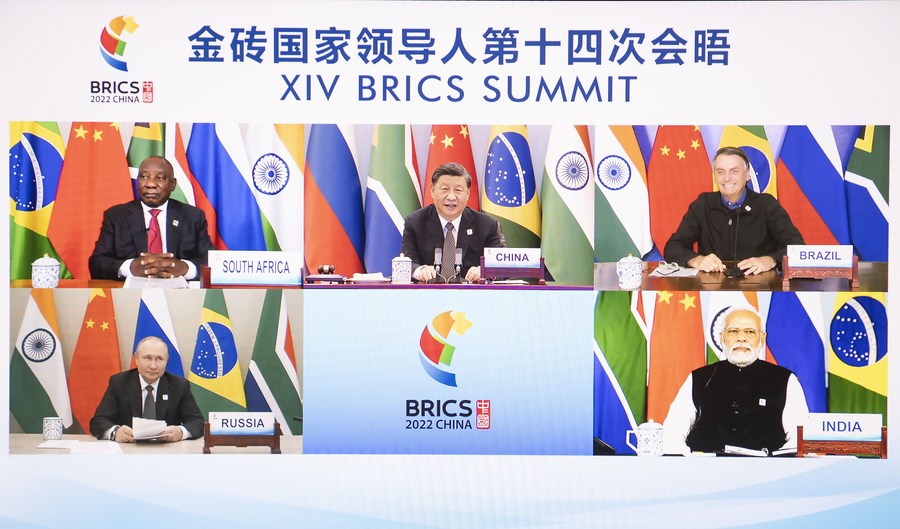
BRICS countries, as important emerging markets and major developing countries, need to act with a sense of responsibility to bring positive, stabilizing and constructive strength to the world, President Xi Jinping said on Thursday.
Xi made the remarks while chairing the 14th BRICS Summit via video link in Beijing. BRICS is a group of countries which includes Brazil, Russia, India, China and South Africa.
The summit, titled "Fostering High-quality Partnership and Ushering in a New Era of Global Development", comes as the world faces the continued spread of COVID-19, a tortuous world economic recovery and increasingly salient peace and security issues.
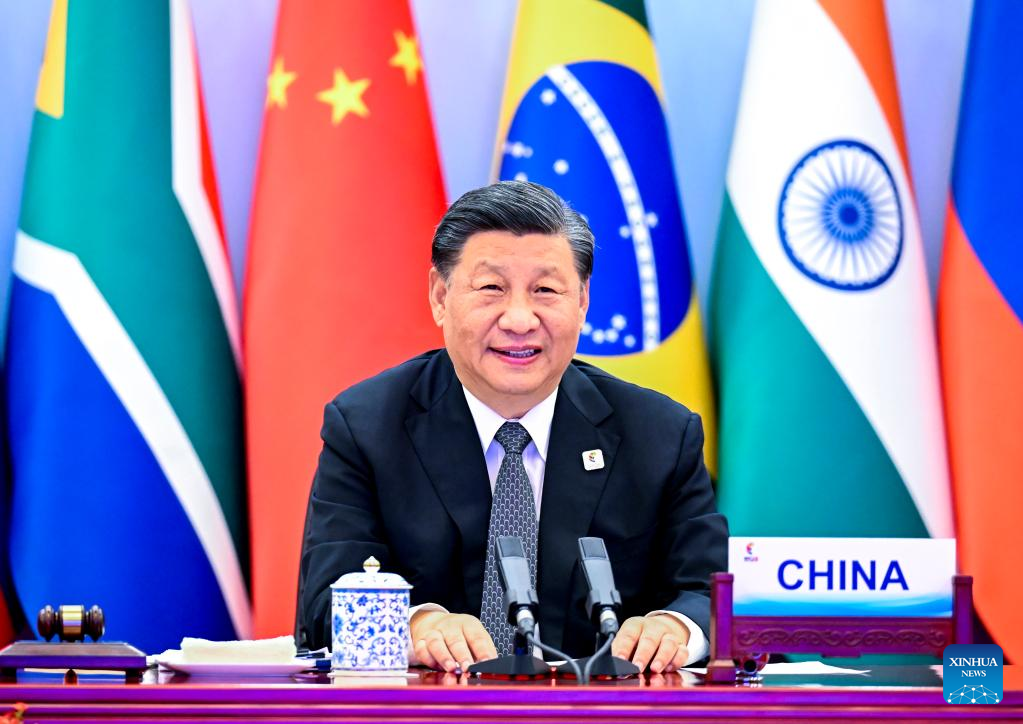
Facing formidable and complex circumstances, BRICS countries need to speak out for equity and justice and jointly encourage the international community to practice true multilateralism, Xi said.
He underlined the need to reject a Cold War mentality and bloc confrontation, oppose unilateral sanctions and abuse of sanctions and reject small circles built around hegemonism by forming one big family in a community with a shared future for mankind.
He called for enhancing international cooperation on COVID-19, pooling strength for economic recovery, stepping up macro policy coordination and keeping industrial and supply chains secure and unclogged.
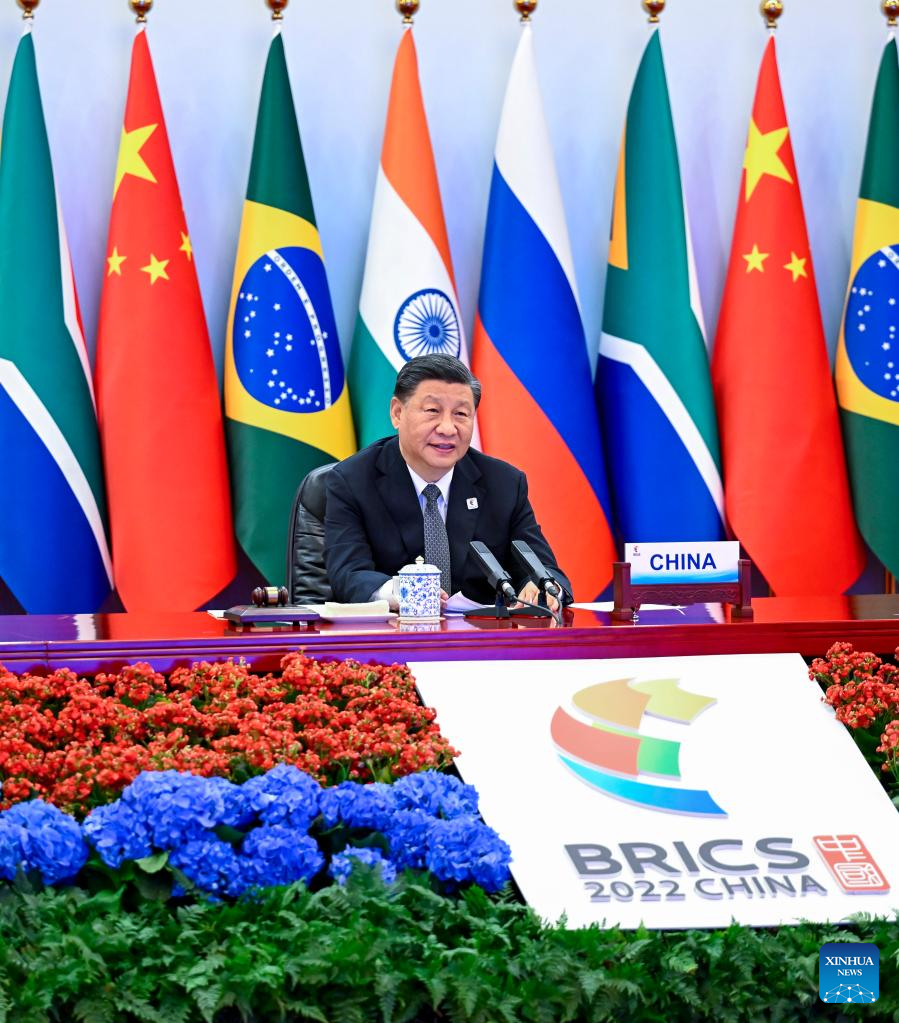
While stressing the need to build an open world economy, Xi also emphasized the importance of forestalling and defusing major risks and challenges in global development and working for more inclusive and resilient economic growth.
"We need to advocate sustainable and people-centered development, invest more in poverty alleviation, food, education, health and so on, and promote the implementation of the UN's 2030 Agenda for Sustainable Development to bring stronger, greener and healthier global development," he said.
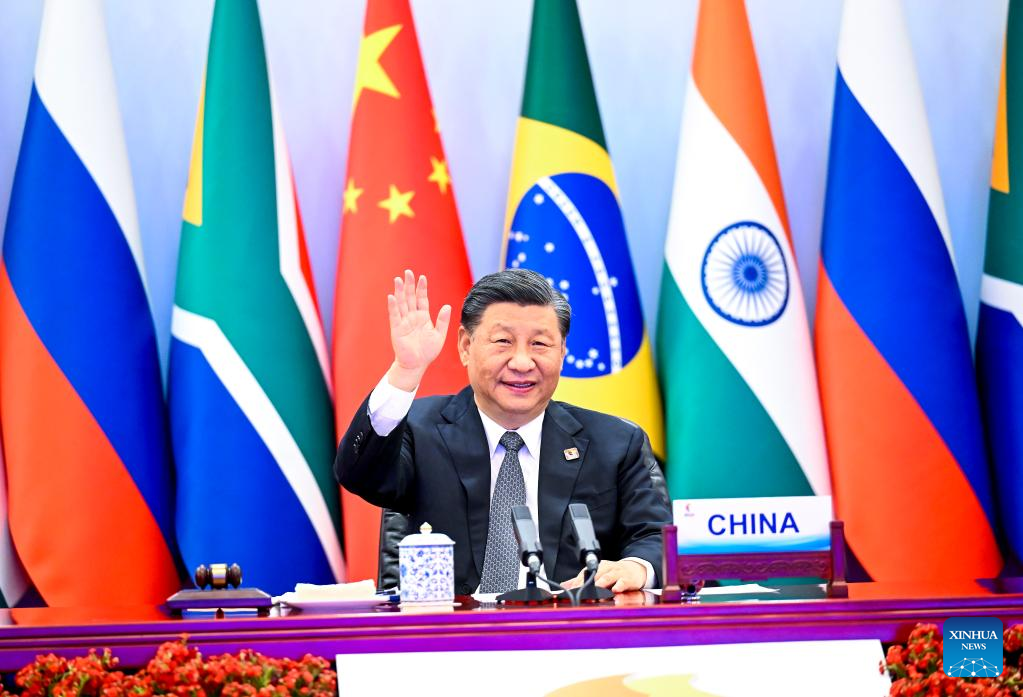
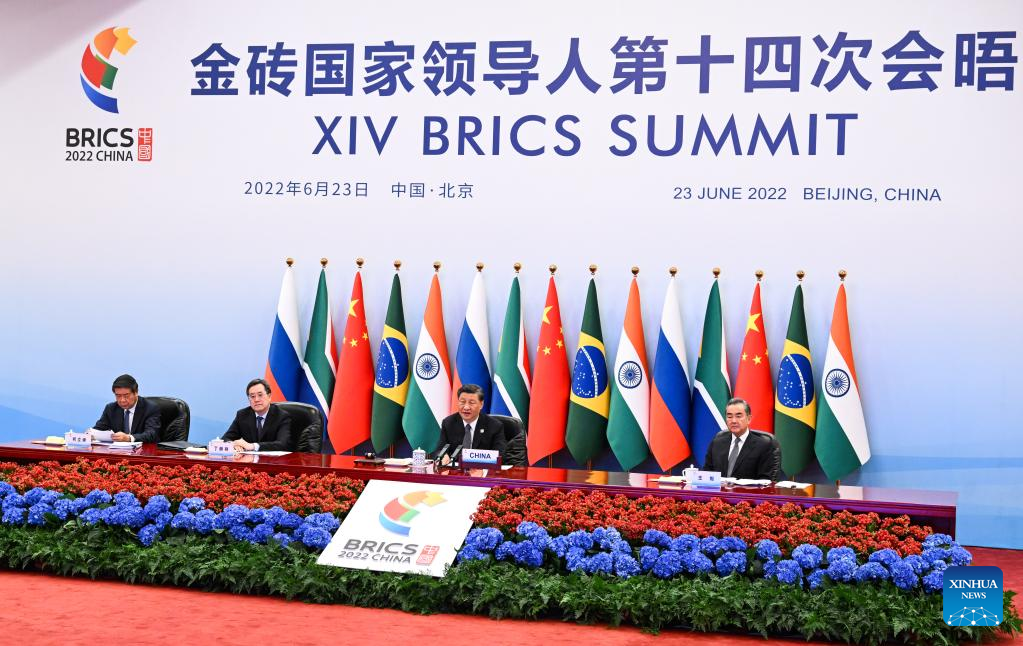
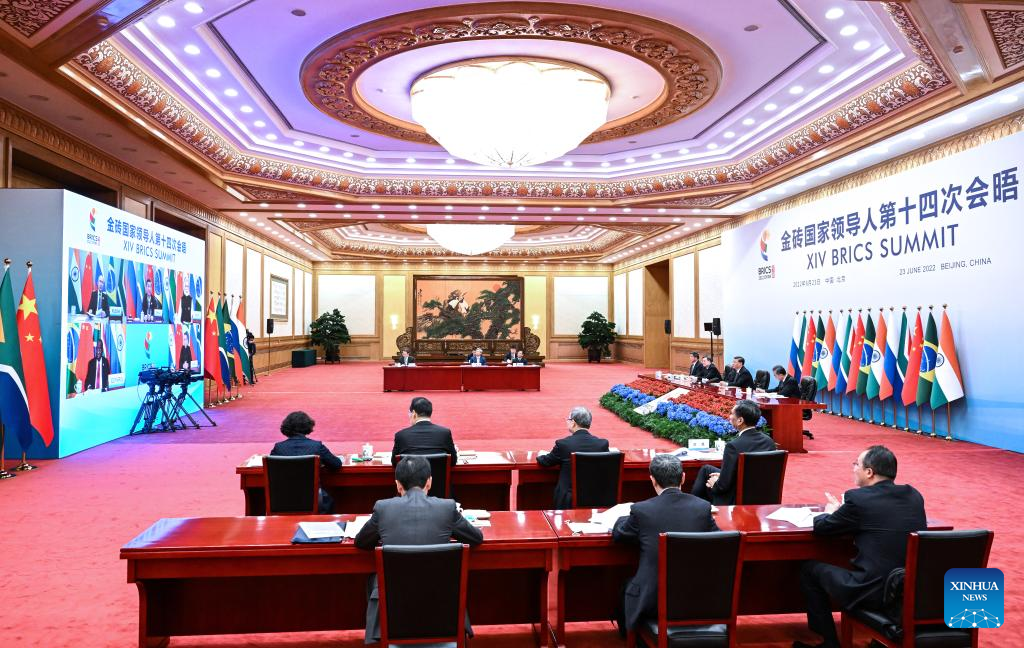
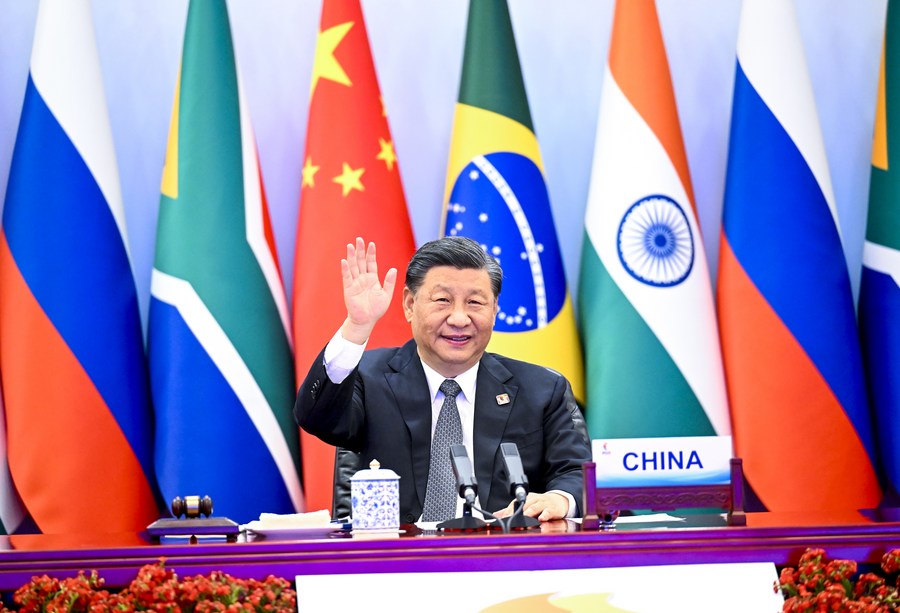
BEIJING - On the evening of June 23, President Xi Jinping hosted the 14th BRICS Summit in Beijing via video link.
President Xi noted that over the past year, the world has faced the continued spread of COVID-19, a tortuous world economic recovery and increasingly salient peace and security issues. Facing the formidable and complex circumstances, BRICS countries have embraced the BRICS spirit of openness, inclusiveness and win-win cooperation, enhanced solidarity and coordination and jointly tackled the challenges. The BRICS mechanism has demonstrated resilience and vitality. BRICS cooperation has achieved sound progress and results.
President Xi stressed that this Summit is held at a critical juncture in the shaping of the future course of humanity. BRICS countries, as important emerging markets and major developing countries, need to act with a sense of responsibility to bring positive, stabilizing and constructive strength to the world.
President Xi said that first, we need to speak out for equity and justice. We need to encourage the international community to practice true multilateralism and uphold the international system with the UN at its core and the international order underpinned by international law, and urge the world to reject the Cold War mentality and bloc confrontation, oppose unilateral sanctions and abuse of sanctions, and reject the small circles built around hegemonism by forming one big family belonging to a community with a shared future for humanity.
Second, we need to remain firm in our conviction that we will defeat the pandemic and act responsibly to protect our peoples and their lives. We need to build a strong line of defense against the virus, enhance international COVID response cooperation, and jointly defend people's lives and health.
Third, we need to pool strength for economic recovery, step up macro policy coordination, keep industrial and supply chains secure and unclogged, build an open world economy, and forestall and defuse major risks and challenges in global development, to work for more inclusive and resilient economic growth.
Fourth, we need to advocate sustainable and people-centered development, invest more in poverty alleviation, food, education, health and so on, and promote the implementation of the UN's 2030 Agenda for Sustainable Development, to bring stronger, greener and healthier global development.
President Xi said he looks forward to an in-depth and vibrant discussion under the theme of "Fostering High-quality Partnership and Ushering in a New Era of Global Development" to jointly contribute wisdom and ideas to the high-quality development of BRICS cooperation.

Russian economy is carrying on although its top officials and companies from the energy sector, fintech, transport and machinery fell under unprecedented pressure from Western sanctions. Under these heavy pressuring circumstances Russian companies as well as their counterparts overseas are looking for "safe harbor" to maintain financial transactions and commodities exchange.
Whatever the political reasons behind those sanctions are, Russia is deeply integrated into global value chains. So far the Commonwealth of Independent States (CIS) countries and some Asian countries are trading with Russia. India, China, Turkey and the United Arab Emirates are among those with legal cooperation with Russia under the sanctions, first of all in prices for energy resources.
The scenario was emphasized at the annual summit of BRICS Business Forum 2022 on June 22, during which Russian President Vladimir Putin notified that economic links with the developing world are close and the Russian economy remains strong despite all odds.
An ongoing campaign against Russian gas and oil in Europe will lead to a gradual decrease in demand but keep its currency Ruble potent. While this process could take years, others including the United States for quite some time may take advantage of it by increasing their import from Russia with a discount.
Significantly, these provide non-legal or semi-legal channels for Russian capital flow. Russia has been developing under sanctions throughout its history. It faced its first most intense sanction pressure in 2014, when the Russian government started to push its financial institutions towards autonomy.
This initiative has been rather successful: in just five years it has built up its own bank data massaging system to replace US-dominated SWIFT system, its own payment system "MIR" to replace Visa and Mastercard, and a number of other fintech services. These achievements allow the Russian financial system to function relatively well even now.
All along Russia has been promoting its own free trade initiative – EEU, and reciprocal payments in national currencies between the trade partners, while its banks have been building up their international network of subsidiary enterprises, joint ventures and affiliated companies with a sophisticated hierarchy. Basically, this financial system is what will really determine the movement of Russian capital.
Russia is not just a fuel behemoth, it is also a leader in wheat exports and among top five metal and rare earths producers. Russia's share of world total mining and production of platinum is 10 percent, gold 10 percent, diamonds 30 percent and palladium 40 percent. Moreover, Russia produces 13 percent of all fertilizers and is the largest wheat exporter -- 18 percent of the global total.
Complete isolation of Russia could trigger a serious disruption to global economy. Reduced metal, wheat and other raw materials shipments threaten to further tighten a market that is already short on supply. Although metals were not targeted by Western sanctions, their prices rose to historic heights in recent weeks.
On the other hand, Russia is heavily dependent on foreign supply of high-tech products: telecommunication devices, machinery and appliances, mining equipment, vehicles, various components, medicine, etc. Imports equaled around 20 percent of its GDP in 2020 with most of it coming from the EU.
Now this high-tech import is restricted. The United States has warned foreign high-tech manufacturers using American technologies, including China, that such exports to Russia must first be licensed by Washington, a demand that could be against free trade rules by the World Trade Organization.
The Western sanctions are biting and causing global impact on the supply of food and fuel among others, mostly the developing world. But Russia itself has proven its resilience and efficacy in emergency responses.
What should be remembered is that the deep interdependency of global economy means there are no more purely national economies. Hence, even under sanctions Russia will continue to trade off its commodities in exchange for high-tech goods with its counterparts in the EU and US.
All sides of the Russia-Ukraine conflict will pay a sort of a tax or interest rate, levied on risk and transaction costs, to third countries, which are playing the median role of a "safe harbor".
The author is editor for Top Russian Startups Series, and consulting advisor on markets. He served as co-editor for joint Russian-Chinese printed supplement with SCMP.
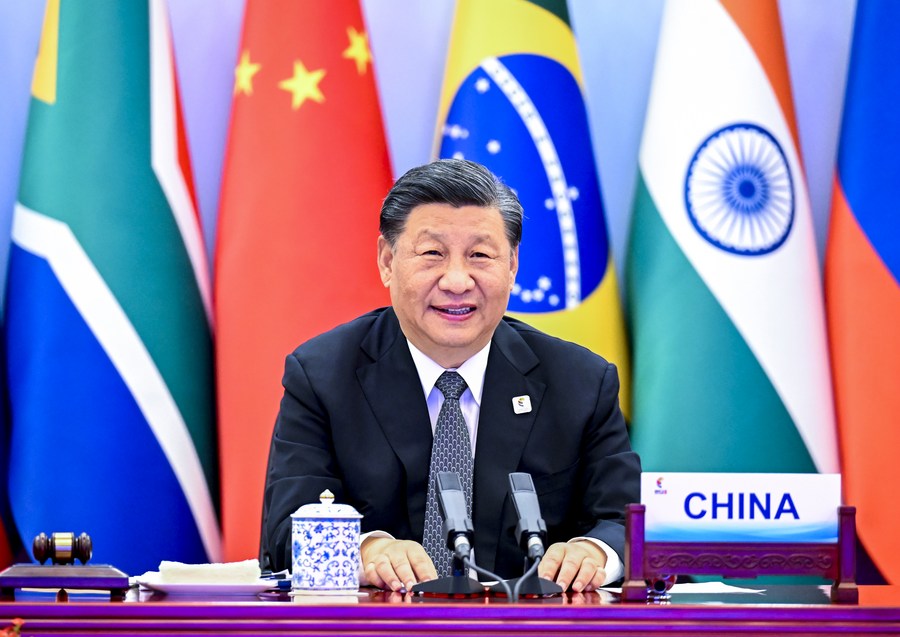
President Xi Jinping chaired and addressed the 14th BRICS Summit in virtual format in Beijing on Thursday.
BRICS is a group of countries which includes Brazil, Russia, India, China and South Africa.
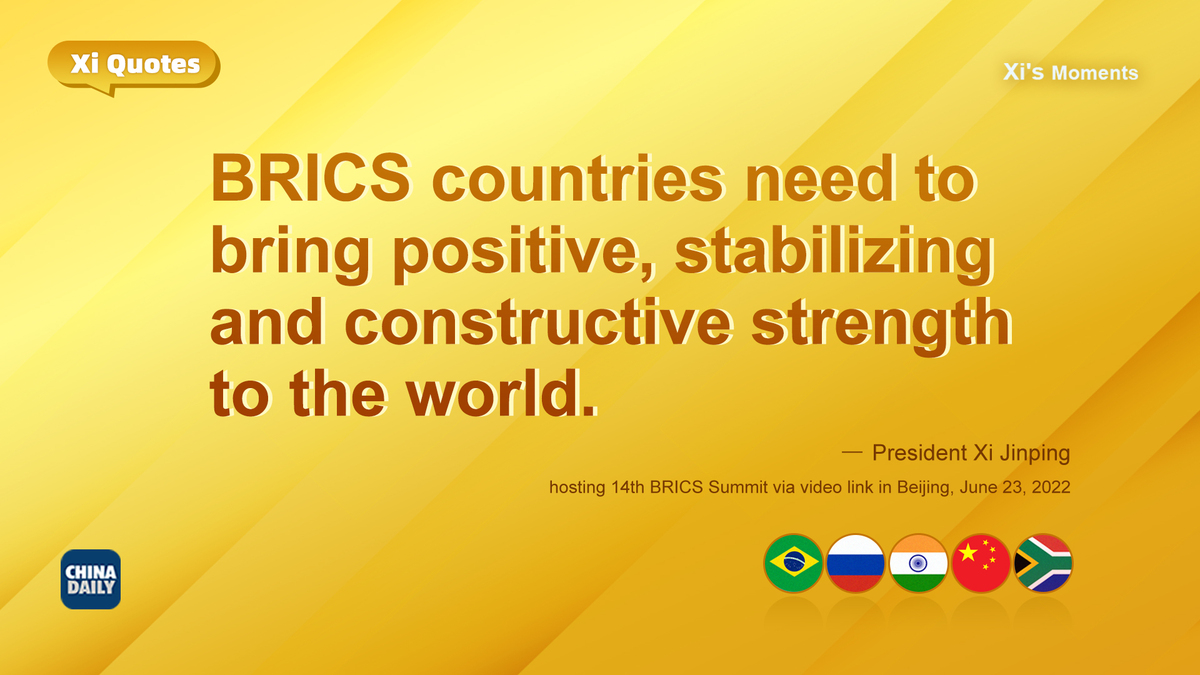
The summit, titled "Fostering High-quality Partnership and Ushering in a New Era of Global Development", comes as the world faces the continued spread of COVID-19, a tortuous world economic recovery and increasingly salient peace and security issues.
Here are some highlights from his speech.
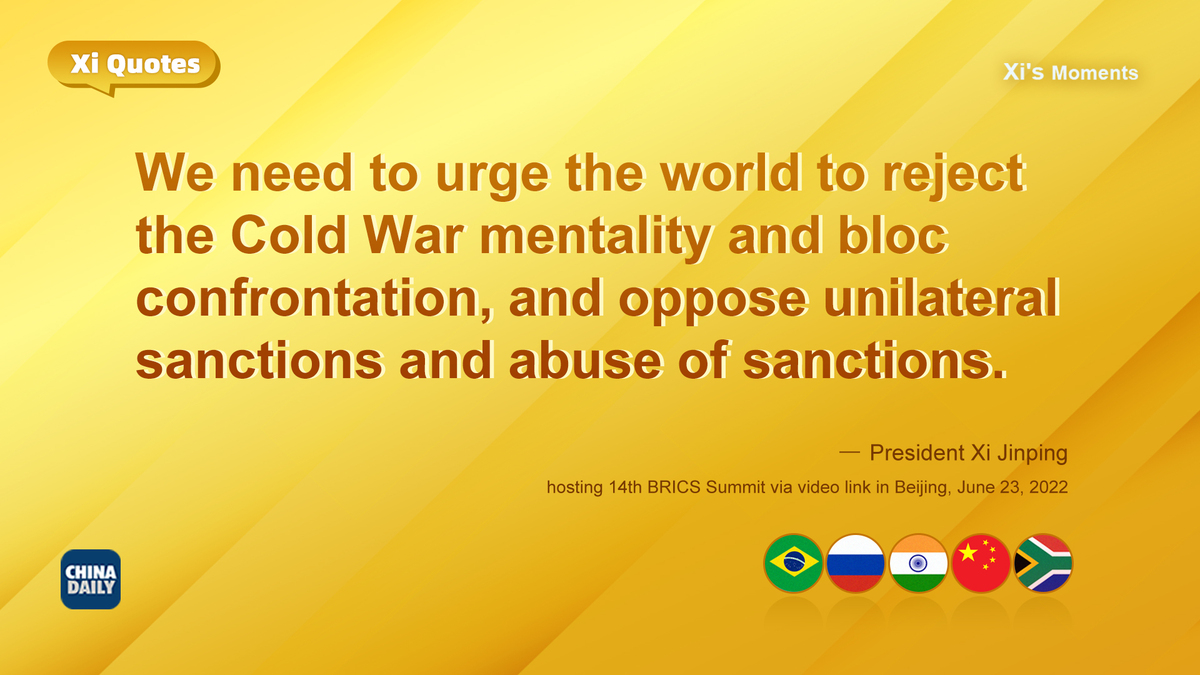
BRICS countries, as important emerging markets and major developing countries, need to act with a sense of responsibility to bring positive, stabilizing and constructive strength to the world, Xi said.
Facing formidable and complex circumstances, BRICS countries need to speak out for equity and justice and jointly encourage the international community to practice true multilateralism, Xi said.
He underlined the need to reject a Cold War mentality and bloc confrontation, oppose unilateral sanctions and abuse of sanctions and reject small circles built around hegemonism by forming one big family in a community with a shared future for mankind.
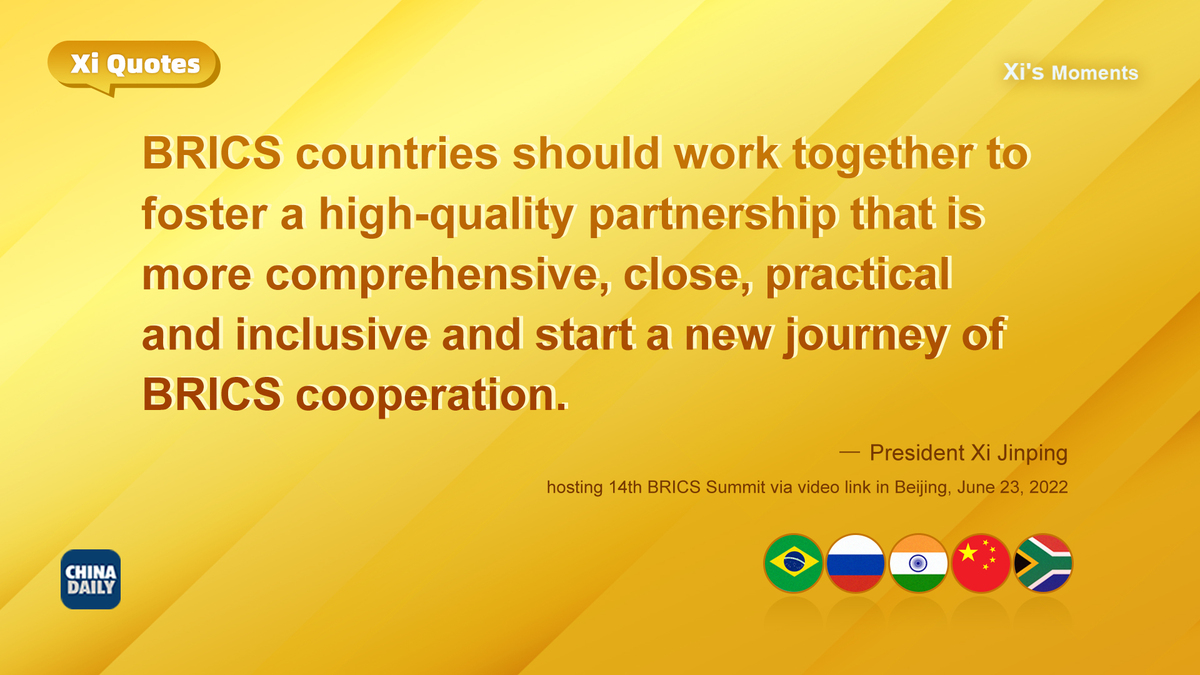
Xi calls for fostering high-quality partnership
Xi called on BRICS countries to work together to foster a high-quality partnership and start a new journey of BRICS cooperation.
At this historical crossroads, BRICS shall not only look back at the journey behind and keep in mind why the BRICS mechanism was started, but also work together for a shared future, Xi said.
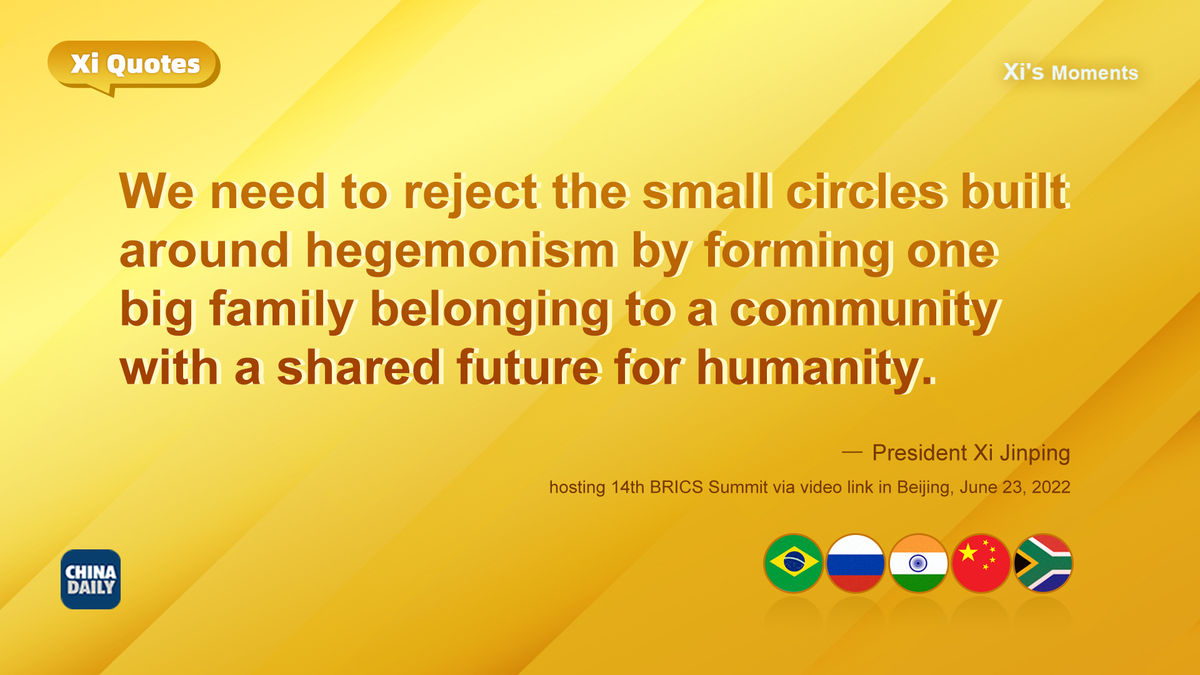
Xi calls on BRICS countries to safeguard world peace, tranquility
Certain countries, in attempts to expand military alliances to pursue absolute security, have coerced others to pick sides and created confrontation, Xi said, adding that they ignored other countries' rights and interests while seeking supremacy.
"The world will become even more volatile and unstable if we allow the dangerous trend to continue," Xi said.
BRICS countries should support each other on issues concerning their respective core interests, practice true multilateralism, uphold justice, fairness and unity, and oppose hegemony, bullying and division, Xi said.
Xi said China is willing to work with BRICS members to promote the effective implementation of the Global Security Initiative to contribute to global stability.
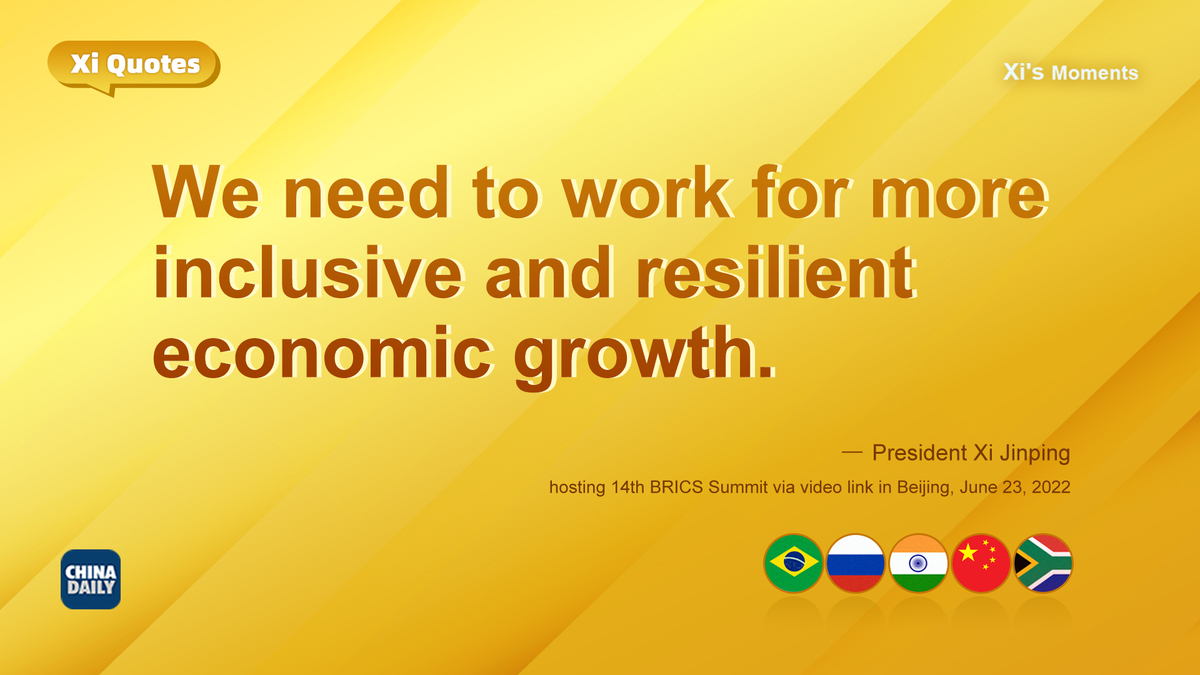
Xi says China to work with BRICS partners to advance Global Development Initiative
China is ready to work with BRICS partners to advance the Global Development Initiative for concrete outcomes and push for the UN 2030 Agenda for Sustainable Development to provide support for global development that is stronger, greener and healthier, Xi said.
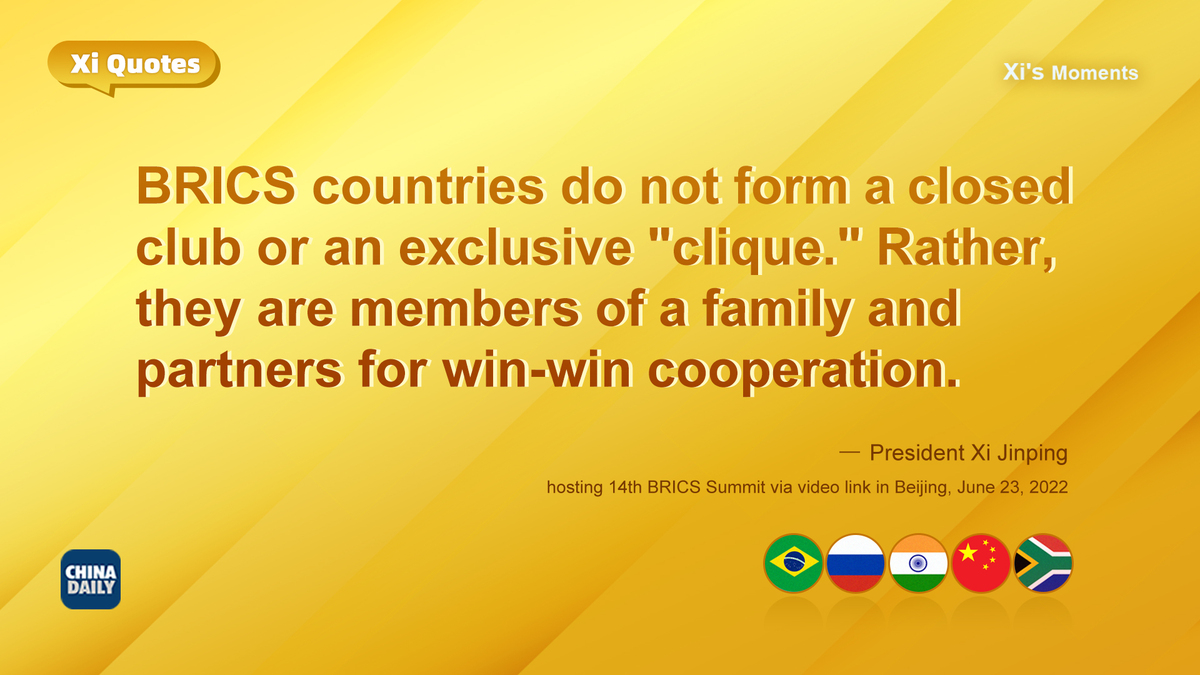
Xi calls on BRICS to stay open, inclusive
BRICS countries do not form a closed club or an exclusive "clique." Rather, they are members of a family and partners for win-win cooperation, Xi said.
Over the past five years, the "BRICS Plus" approach has set a fine example for emerging markets and developing countries to advance South-South cooperation and gain strength through unity, Xi said.
Under the new circumstances, BRICS countries need all the more to pursue development and enhance cooperation, he said.
Xi added that the expansion process of the BRICS cooperation mechanism should be pushed forward to allow like-minded partners to join the big BRICS family at an early date.
Editor's note: President Xi Jinping attended the opening ceremony of the BRICS Business Forum in virtual format and delivered a keynote speech. Here are some highlights.
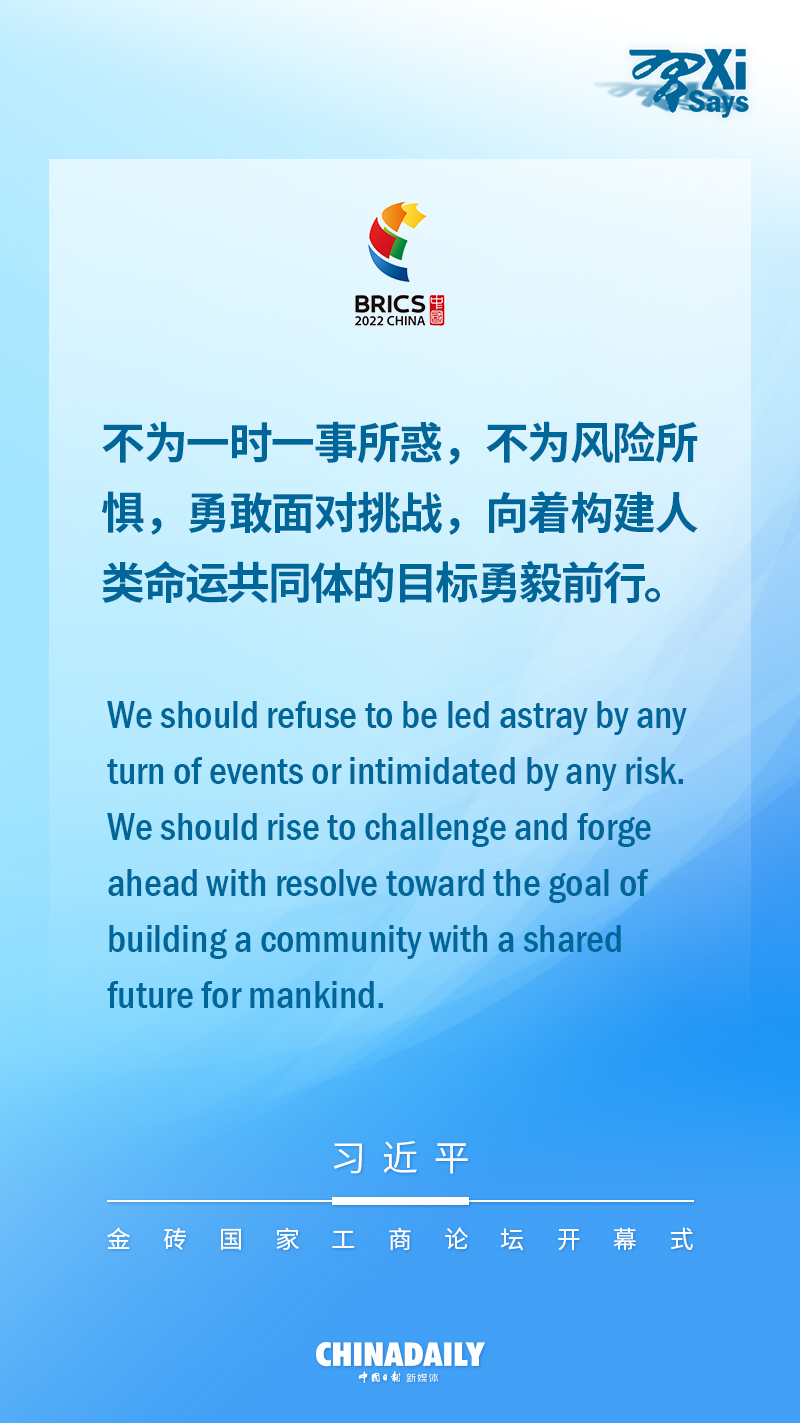
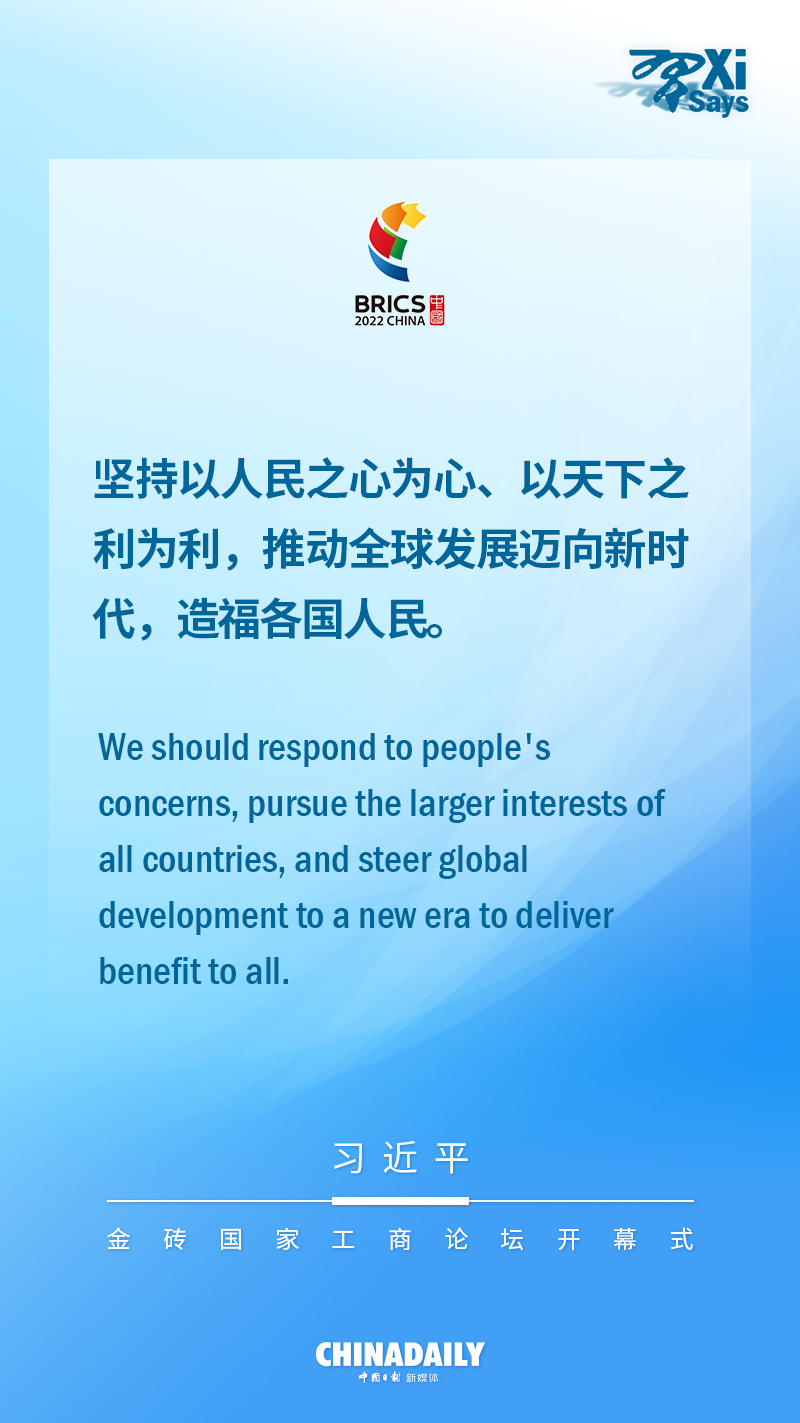
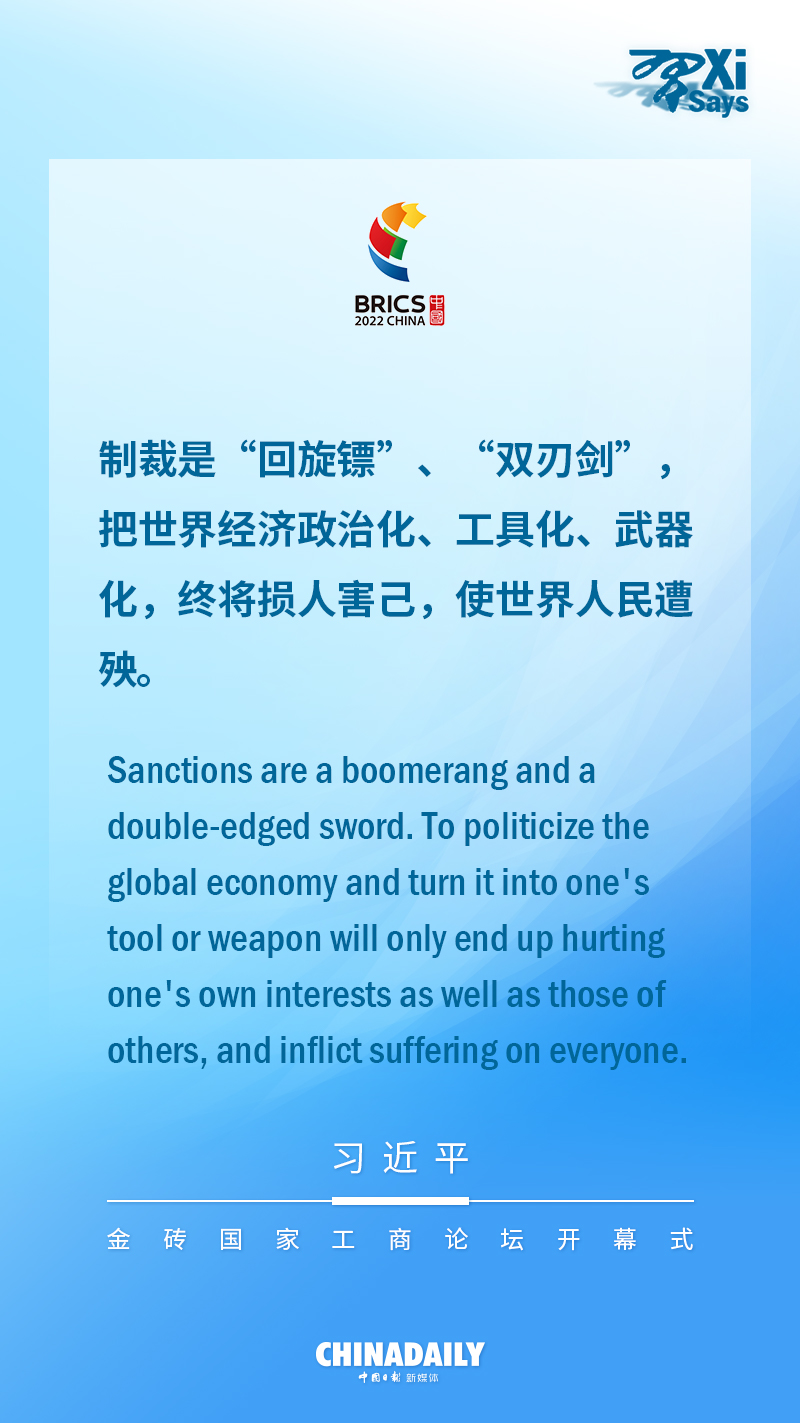
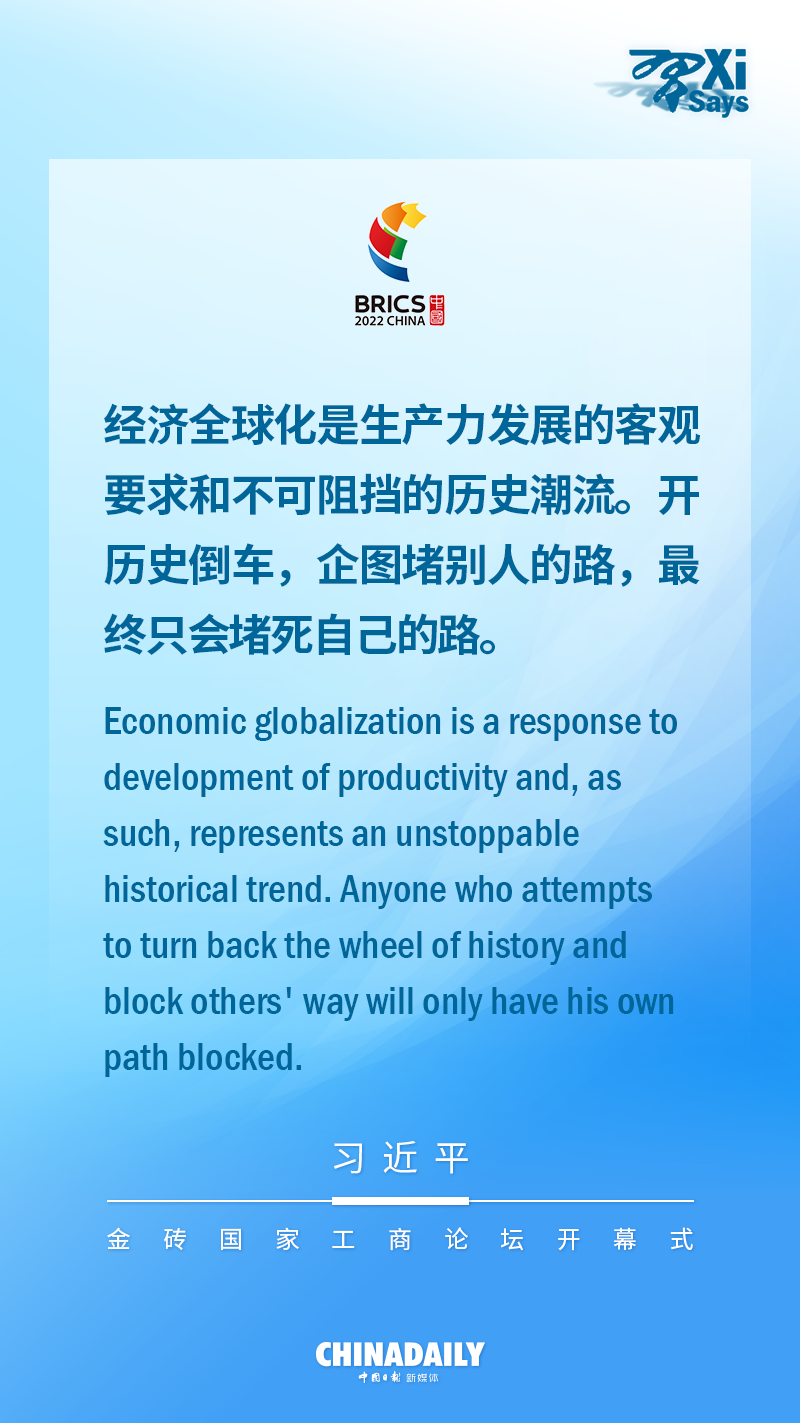
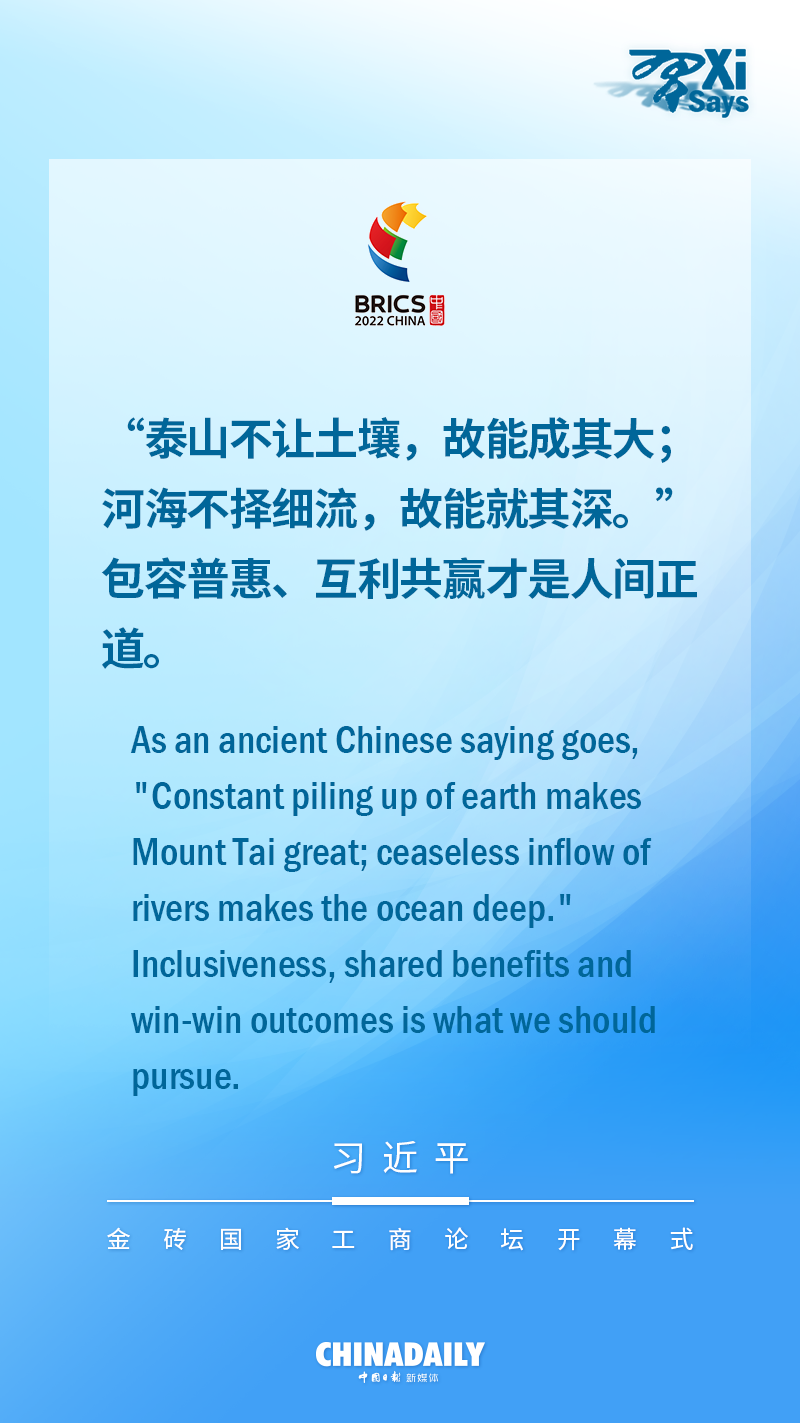
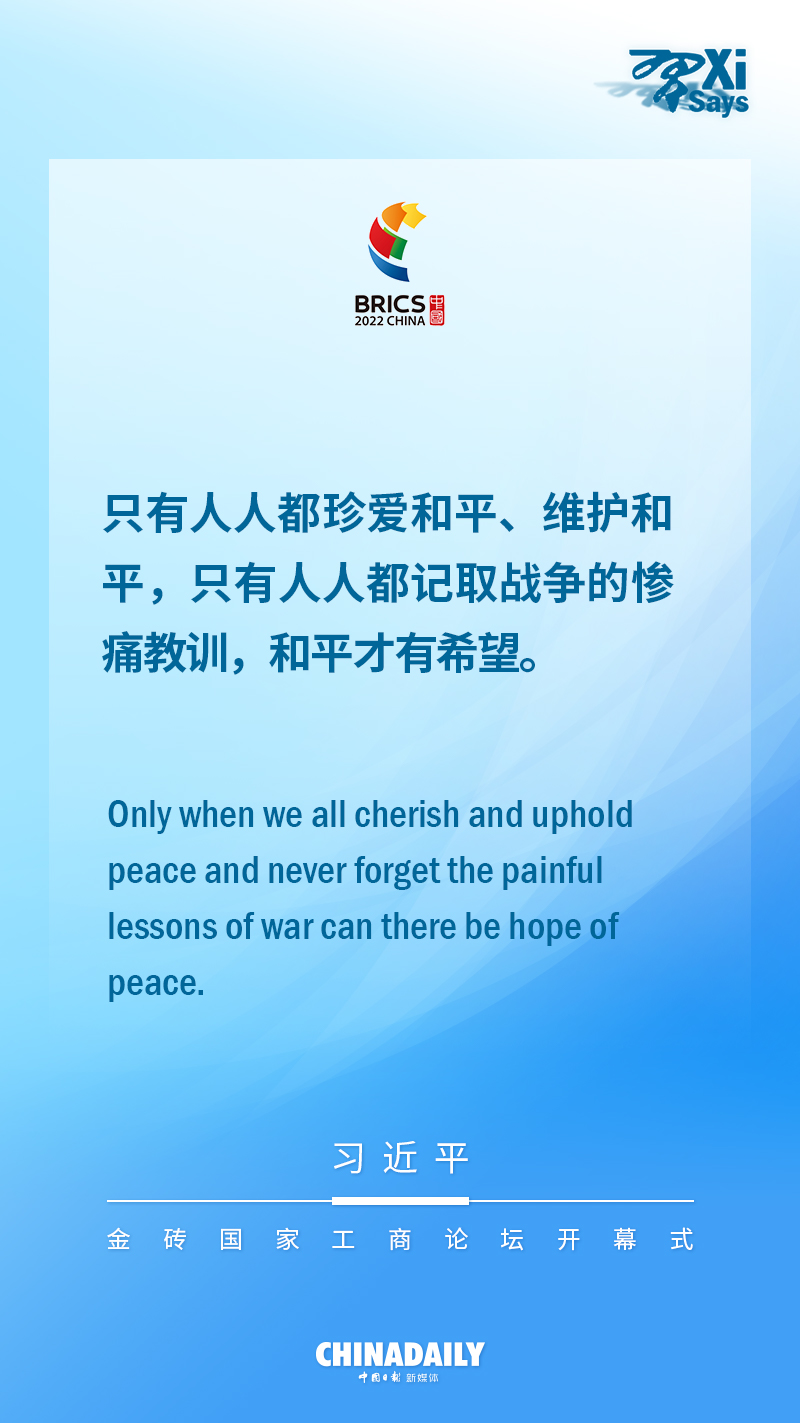

Leaders coming together for the BRICS Summit are expected to discuss global challenges such as the pandemic, climate change and global governance, say African experts who are keen to see a bigger global role for the grouping of emerging economies.
Saliem Fakir, a senior climate diplomacy and geopolitics adviser at the African Climate Foundation in South Africa, said the pandemic response will likely figure prominently, noting that China has been the "key provider of vaccines to Africa". More broadly, Fakir said the summit on Thursday is expected to project the grouping even deeper into a future in which South-South cooperation grows more important.
With the 27th United Nations Climate Change Conference of the Parties, or COP 27, to be held in Egypt in November, climate change is shaping up as an important topic for discussion at the virtual summit, which brings together the leaders of Brazil, Russia, India, China and South Africa.
"In the year of the 'Africa COP', we expect them (BRICS members) to tackle the climate negotiations" while affirming the principle of common but differentiated responsibilities, Fakir said.
The senior adviser said the talks may encompass technology-driven approaches in the cooperation against climate change, pointing out China's strengths in digital technology including artificial intelligence.
Fakir said many in Africa are looking to the opportunities offered by the New Development Bank, an institution launched under the BRICS framework.
"From an African perspective, there is also the role of institutions such as the BRICS bank in addressing some of the challenges from climate finance, financing for renewable infrastructure and agriculture," he said. "Its potential to become a major bank of the future for the South is underutilized. Within Africa, more and more are asking how the bank can be better capitalized to scale up its operations notably in renewable infrastructure financing. We hope the answer will emerge from the summit."
Cooperation mechanism
Fakir said that the BRICS cooperation mechanism will always remain relevant.
Dennis Munene, executive director of the China-Africa Center at the Africa Policy Institute in Nairobi, Kenya, said the BRICS countries aim to promote peace, security, cooperation, and development. He suggests the group can be expanded to include more African countries in order to broaden South-South cooperation.
"Amid the current global economic crisis, the BRICS member states have a unique opportunity to provide renewed impetus to global economic cooperation," he said. "For example, BRICS trade and investment with low-income countries has served as a major support system during the COVID-19 pandemic, with China taking the lead in the fight against the pandemic."
Naledi Pandor, South Africa's minister of international relations and cooperation, recently told Parliament that the country is using its BRICS membership to address its challenges. "We continue to derive great value from the BRICS partnership," she said. "We look forward to leading further progress on BRICS initiatives once more, as we assume the chair of BRICS in 2023."
The writer is a freelance writer for China Daily.

President Xi Jinping will host the 14th BRICS Summit on Thursday and the High-level Dialogue on Global Development from Beijing on Friday in a virtual format, at a time when the COVID-19 pandemic has affected the global economy and has disrupted global gains in poverty alleviation and the implementation of the United Nations 2030 Agenda for Sustainable Development.
The BRICS countries-Brazil, Russia, India, China and South Africa-can galvanize their collective clout as the world's leading emerging economies to firmly support the Global Development Initiative proposed by Xi, and ensure that no country and no person is left behind in combating COVID-19.This can be done through universal vaccination programs, enhancing food security, poverty reduction and financing for development, as well as by advancing digital economy and connectivity, industrialization and green development.
Together, the BRICS countries comprise more than 3.2 billion people, or 42 percent of the world's population, and cover more than one-fourth of the world's land area. In addition, they account for more than 31 percent of global GDP.
Thus, amid the current global economic crisis, the BRICS countries have a unique opportunity to provide renewed impetus to global economic cooperation. For example, BRICS' trade and investment with low-income countries have served as a major support system during the pandemic, with China taking the lead in the fight against COVID-19.
Nonetheless, in embracing the summit's theme of "Foster High-Quality BRICS Partnership, Usher in a New Era for Global Development", it is time for the BRICS group to add more like-minded partners to form "BRICS Plus".
Looking back, China invited South Africa to join what was then BRIC on Dec 24, 2010. South Africa became the only member representing the continent of Africa, which has a population of about 1.4 billion people, produces at least 50 percent of the diamonds and gold in the world, and has the world's largest free trade area (the African Continental Free Trade Area), which is creating an entirely new development path for its people.
However, Africa still remains poor and fragile, which leads to proposing more representation in the BRICS group. In fostering dialogue and cooperation with other emerging markets and developing countries, as well as international organizations, to broaden South-South cooperation for common development and prosperity, the East African Community's member states should qualify for consideration to join "BRICS Plus".
The East African Community countries-the Democratic Republic of Congo, Tanzania, Kenya, Burundi, Rwanda, South Sudan and Uganda-bring to the table a market size of approximately 300 million people with a combined GDP of about $240 billion.
Other than the market value and human capital, the member countries also have an abundance of natural resources such as titanium, gold, oil, gas, cobalt, nickel, diamonds, copper, coal and iron ores. In addition, the East African Community has invested heavily in infrastructure development through the Belt and Road Initiative, developed its macroeconomic policies, enhanced its peace and security strategy, and has countries that are strategically located to boost international trade and cooperation. Key among these countries is Kenya.
According to the Africa Regional Integration Index Report 2019, Kenya is the second-best country, in terms of regional integration policies, in the East African Community. Its performance on regional infrastructure, productive integration, free movement of people and financial and macroeconomic integration is high, the report said.
Further, Kenya enjoys trade facilitation agreements through the World Trade Organization and regional groups.
As one of the anchor countries in the expansion of China-Africa cooperation and a key proponent of the Global Development Initiative, Kenya can effectively represent the East African Community in the proposed "BRICS Plus". It can bring a wealth of experience as a member of the African Union Peace and Security Council and a nonpermanent member of the United Nations Security Council to boost Africa's representation in the BRICS fraternity to enhance world economic recovery, with a view to achieving stronger global development.
The author is executive director of the China-Africa Center at the Africa Policy Institute in Kenya.
South Africa sees the BRICS grouping of nations as a beacon of peaceful cooperation in a world facing challenges arising from the pandemic and conflicts to a global economy coming under increasing pressure, the country's top envoy to China said ahead of the 14th BRICS Summit.
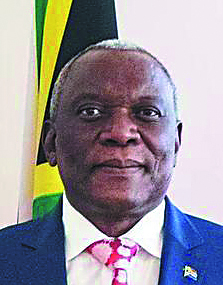
The summit, to be hosted on Thursday by President Xi Jinping, will be held virtually on the theme "Foster High-quality BRICS Partnership, Usher in a New Era for Global Development".
"BRICS is an important forum where issues of importance to the developing world are discussed, notably the global economic and financial architectures, including its leadership," Siyabonga Cyprian Cwele, the South African ambassador to China, said in a written interview with China Daily.
The world is very interested in this platform because it is evolving and resulting in diverse nations cooperating in an unpredictable global environment, he said.
The grouping has its origins in a diplomatic initiative in 2006 when the foreign ministers of Brazil, Russia, India and China met for the first time on the sidelines of the UN General Assembly. The then BRIC nations welcomed South Africa as a member in 2011, with the enlarged grouping adopting the term BRICS.
The BRICS countries, comprising more than 40 percent of the world's population, produce 24 percent of global GDP and account for 16 percent of world trade, data from the World Bank shows.
Cwele said that over the years the BRICS countries have elevated their rankings in a range of economic gauges and expanded all-round cooperation, particularly in the economic and trade sectors. These efforts have yielded substantial results over the past decade, he said.
Cwele said that it is important that the grouping "continues to address the key developmental challenges of poverty, underdevelopment and inequality, which have been relegated to the margins by most in the developed North".
Critical challenge
The fact that China has pulled its people out of extreme poverty and achieved the UN Sustainable Development Goals 10 years ahead of schedule serves as an inspiration to those developing countries that are still trying to deal with this critical challenge, he said.
"We believe that BRICS has a profound appreciation of the urgency with which global challenges need to be addressed, in particular now that the COVID-19 pandemic has slowed down trajectories of the global economic growth," he said.
Cwele said that intra-BRICS cooperation will focus more on what he called the epic fight against the pandemic, and that the member countries are also deliberating how to strengthen macroeconomic policy coordination and jointly stabilize the global industrial supply chains.
In addition to hosting the summit, President Xi will also host the High-level Dialogue on Global Development in Beijing on Friday. The leaders of the BRICS nations, along with those of other developing countries, will participate in the event online. Xi first put forward the Global Development Initiative when addressing the general debate of the 76th session of the UN General Assembly via video link in September.
The GDI, which is consistent with the UN's 2030 Agenda for Sustainable Development, aims to foster greater synergies in areas such as poverty reduction, food security, anti-pandemic efforts, development financing, climate change, digital economy and industrialization in nations' pursuit of the Sustainable Development Goals.
"The free-flow of ideas and the significance placed on consensus by BRICS members in all areas of cooperation is how the platform has maintained its vibrancy," Cwele said.
He said that all initiatives that enrich the platform and improve its effectiveness have historically been welcomed into the platform, including the BRICS Outreach program initiated by South Africa.
"We expect our efforts will leverage not only our combined economic strengths and influence as BRICS, but also our partnerships with other emerging market and developing economies, to drive sustainable economic recovery including through industrialization and ensuring diversification across the world," he said.
